

Split Croatia Travel Guide
Your guide to Split Croatia
Home » Split » Getting From Budapest to Split
Getting From Budapest to Split
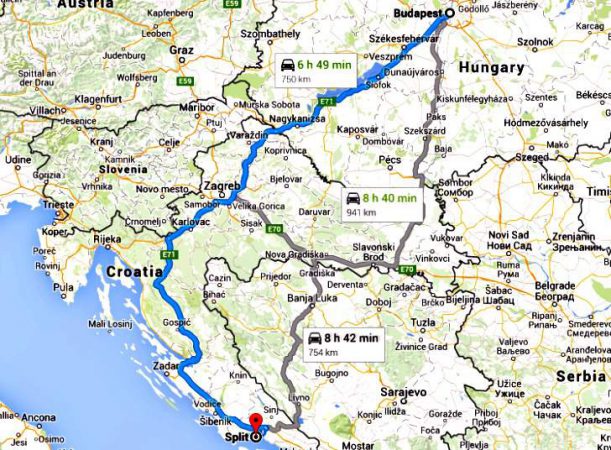
Hungary is one Croatia’s neighbors and it’s quite easy to travel from Hungary to Croatia, especially if you’re traveling to or from Budapest.
My article will provide you with comprehensive information on how to get from Budapest to Split, including bus, train, taxi transfers, and flights, and you can use the following links to quickly jump to a particular section:
- Private transfers
Budapest is covered by a number of airlines that operate flights from almost all European airports, particularly from British ones. However, I wouldn’t advise flying to Budapest if your only intention is to reach Croatia from there.
It’s more suitable flying to Italy (Venice for example), Slovenia or Austria, and then continue to Croatia depending on where your final destination is.
However here’s some information on how to reach Croatia from Budapest if Hungary is on your travel plan through Europe.
If you are planning to visit Split from Budapest in July or August (not recommended due to a huge number of tourists), the heat and unbearable humidity will persuade you that only cooling place will be once you reach Adriatic sea, and you’ll want it as soon as possible. Read more about top overland tour from Budapest to Dalmatian coast !
Traveling from Budapest to Split by train
There are several direct trains per day from Budapest Keleti station to Zagreb, with the journey taking between 6 and 6 and a half hours. From Zagreb, you can then take a train or bus to Split as your destination in Croatia.
There is also night train that travels to Split in summer ( mid-June to the end of August ), twice a week. Journey time of this train from Budapest to Split is 15 hours.
See The Trainline or Die Bahn website for the best information about train timetables. All trains leave from Budapest Keleti station and go via Zagreb railway station.
Hungarian Railways also provides timetables for routes from Hungary to Croatia.
Budapest to Split overnight train
Seasonal Train Budapest – Split Departure: 18:20 / Arrival: 08:24 Runs from 13 June till 29 August only. Departures: Tuesday , Friday and Sunday – From Budapest (Keleti station) – Night Train – Find more here!
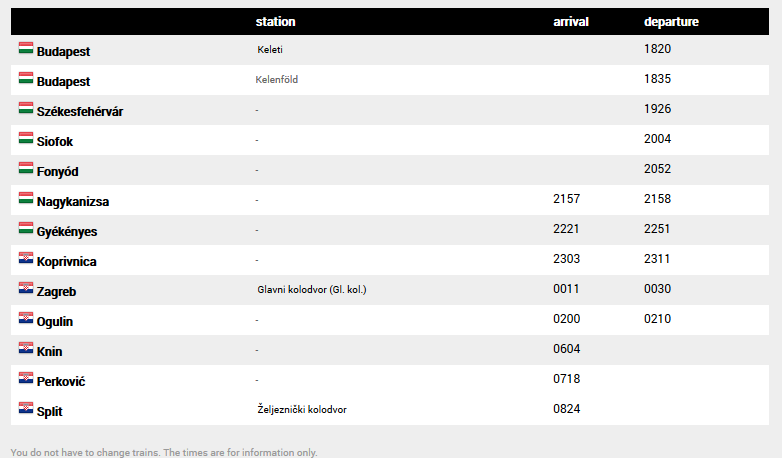
Budapest to Split train ticket and seat reservation price
Checking timetables and reserving tickets in advance is highly recommended, and you can do it on Trainline . On this service you can find out the train price on this route and make a train reservation (seat reservation). On this route timely train reservations are highly recommended.
Buying in advance? Train tickets vary in price depending on several factors, such as how early you book or how many seats are still available.

Night train between Split and Budapest or vice versa runs only during the high season and only one is a direct train (from June 15th to August 31st), while on others you have to change the train in Zagreb. Below is an example of trains on July 14th:
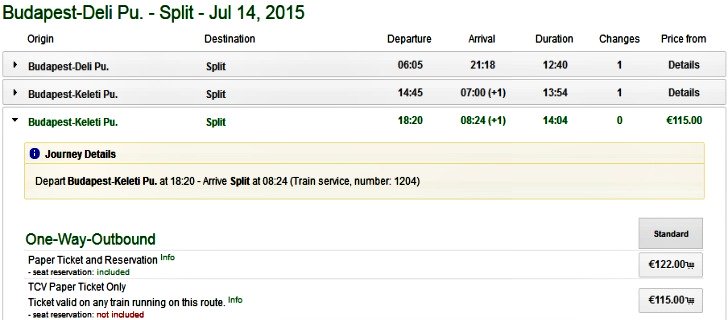
You can see that only one train (number 1204) is a direct one, leaving from Budapest Keleti Pu. station. The first one on the list is a daily train from Budapest Deli Pu. station with a required change of the train in Zagreb. The second one on the list is a night train which also includes a change in Zagreb.
The price of the ticket with a seat reservation (one way) is €122 and without seat reservation (not recommended) is only €7 less (€115).

Again I highly recommend you to use Trainline to book any train tickets in Europe in advance and prevent any potential frustration during your holiday.
Budapest to Split by Air
Flying from Budapest to Split is one of the most convenient ways to get to my country, and typically the fastest. Sadly there are no direct flights from Budapest to Split, and if you decide for airplane travel you will need to transfer once or twice at another airport.
Most flights will first take you from Budapest to Munich or Vienna, where you can continue directly to Split (or even Dubrovnik ), or you’ll have to fly to Croatian capital Zagreb and take another direct flight to Split or other destination. Prices typically range from €300 and above, but considering travel expenses if you travel by car flying may still be affordable.
For your convenience I’ve included a search widget below where you can look up flights from over 1000 different airlines and travel agencies. This enables you to easily compare prices are get the best deal possible.
Budapest to Dubrovnik flights begin on June 7th, 2020. This air connection is again available after more than 13 years. Polish airline LOT will run flights from and to Dubrovnik and Budapest in starting in June and until late September. Flight takes 1 hour and 15 minutes, and is only available on Sundays.
Dubrovnik is another Croatian destination worth seeing. There are many options to get from Dubrovnik to Split . With Split only a 3-hour drive away, it could be a good opportunity to see both cities conveniently considering your plane will land just after 8AM.
Budapest To Split by Bus
Eurolines is Hungarian company which runs direct buses between Budapest and Split. Tickets are available between June 17th up to September 10th (may vary). Check their timetable from this website !
Eurolines’s buses to to Split also stop in Zadar, Biograd, Vodice, Sibenik, Primosten, and Trogir along the way, along with Omis and Makarska. It may also be convenient for you in case you need to travel to any of these destinations.
This line will run only once a week, on Friday to Split and Makarska . To find the selling points in Budapest, you can visit their selling points and travel info page. The detailed timetable can be downloaded here !
EuroLines Hungary runs two express lines from June to September:
- Adria Express – Bus line from Budapest to Rijeka, Pula, Rovinj, Porec, Novigrad and Umag leaving at 21.30 on Friday and arriving in Umag at 09.30 next day.
- Dalmatian Express – Bus line from Budapest to Zadar, Biograd, Sibenik, Trogir, Split, Omis and Makarska. It leaves Budapest at 19.00 on Friday and arriving in Makarska at 09,00 AM next day.

The same company also has a new line Budapest – Dubrovnik – Budva (Montenegro) in the same period. Between June 16th and September 9th you can use their Montenegro Express every Friday to travel from Budapest to Dubrovnik ! This bus line goes through Bosnia and Herzegovina via Neum Corridor . The detailed timetable can be downloaded here , or you can find more info on their website .
All buses are leaving from Népliget bus station where you can buy all international tickets. The station is located in the 9th district at 131 Üllői street, Budapest . Here it is on the map !
It’s easily accessible by public transport, using the M3 metro line and getting off at Népliget Metro station.
By Minibus to Split from Budapest

Eurobusways is one of the fastest ways of reaching Split within 8 hours, much faster than a night train. You can also fly, but from Budapest you have to go to Munich or Vienna and change flights to Split , which is much more expensive.
They offer: Comfortable buses WiFi on-board No luggage fee Free child seat English speaking driver Door to door transfer Full flexible service
This is a van service (for 6 to 8 persons). This company can pick you up in any Budapest hotel and take you to harbor of Split to catch a ferry to one of Central Dalmatia Islands or spend few nights in Split city.
Enjoy their bus service on the way from Budapest to Split with full comfort on board. Their private transfer service can also stop anywhere you wish for lunch, breakfast or dinner or just sightseeing, and you decide what time to go.
Eurobusways offers full help for passengers with disability.
Find more buses Budapest – Split – Budapest
BalkanViator is a useful provider of information on bus timetables, bus tickets, taxi services and ride-sharing in Southeast Europe.

Alternatively you can also find cheap bus tickets and connections via Flixbus , a company connecting hundreds of European cities in dozens of countries.
FlixBus enables you to quickly find all available routes and prices, simply select your departure and destination cities and click search.
Mini Rhapsody Tour By Busabout

This is a top overland tour easily combined with one of their Croatian sailing trips or the Ottoman or Bohemian treks as you get to see Budapest , the aqua wonderland of the Plitvice National Park topped off with a fun Friday night in Split .
You’ll also get a little insight into the Balkan lifestyle along the way.
What’s included?
3 days – budapest hungary to split croatia.
Day 1 : Budapest to Plitvice Day 2 : Plitvice to Split Day 3 : Split
- Adult From €275.00
- Student From €275.00
Prices are in Euro. Please see Busabout website for more accurate and current pricing.
- Guide and driver
- 2 nights accommodation
- 2 breakfasts
- Entry fee to Plitvice National Park
- FREE Lonely Planet guidebook
Split isn’t the end!!!
- Try 8 days One-way Sail from Split to Dubrovnik
- Try 8 days One-way Sail from Dubrovnik to Split
Promotion! Save up to 10% – Use Promo Code: “Summer10”.
Private Transfer from Budapest to Split
I was also recently informed about PrivateTransferBudapest company which offers taxi transfers to Split from Budapest or vice versa. Their private taxi transfer can be arranged according to your own preferences, so if you’d like to make a stop in Plitvice Lakes or Croatia’s capital Zagreb it’s all easy.
You can choose from private cars, MPV’s and vans or even buses, each suitable for 3, 5, 7 or 20 passengers respectively. If you’re traveling with family or sharing expenses with friends, they offer a very comfortable and affordable way to get from Hungary to Split.
You can find more info and price list on their website ! Prices for a basic transfer from Budapest to Split in a car starts at €650 (per vehicle, not per person).
Best way to get from Budapest to Split?
I outlined all the ways to travel from Hungary to Croatia, but there simply isn’t any “best” way to travel. It all depends on your wishes and budget.
If you don’t care about price or sightseeing and just want to get here as fast as possible, air travel is for you. You may miss some fantastic sights along the way but that’s the price of convenience and speed.
One thing I of course didn’t cover in this guide is traveling in your own vehicle. In case you have that option it’s clearly the most convenient way offering you the freedom to explore as you wish and travel when and how you want.
You can also consider renting a car. There are companies offering one-way car rentals so you can drop your vehicle off in Split without additional costs. I highly recommend using AutoEurope or RentalCars for all your car rentals, it will compare dozens of different companies to ensure you can get the best possible price.
Trains are not particularly cheap nor convenient, as a train ticket from Budapest to Split will cost you over €100. They are also the slowest way to travel, and you will even have to change stations along the way. Trains in Croatia are notoriously slow, but this fact may not necessarily be a downside if you plan on sleeping most of the time.
Great choice for both budget and speed are buses. Budapest and Split are connected on daily routes (check Flixbus !). Bus ride from Budapest to Split takes about 10 hours, excluding any potential station transfers, and tickets are available all year long starting at €40.
- Travel to Split
- Traveling to Croatia

If you like this travel guide about Getting From Budapest to Split and found it useful, consider supporting the author with a coffee or share it with your friends:
Compare deals from multiple websites to find your hotel, hostel, or private apartment for the best price! You can also check for flights and ferries to Croatia, book airport transfers in advance, or find most popular tours and cruises, all thanks to my partners!
- Accommodation
If the form above is not loading you can search directly on DirectFerries .
Below are my recommended sailing trips in Croatia from trusted companies and tour operators. Feel free to check the offers and links to find additional information and more related cruises!
From Split:
- Southern Explorer - explore top places between Split and Dubrovnik!
- Luxury at Sea - relaxing luxury cruise of best destinations near Split
- Southern Pearls - one-way cruise from Split to Dubrovnik
- Split to Dubrovnik One-Way Luxury Cruise - travel in style from Split to Dubrovnik
- Split to Dubrovnik Private Sailing Holiday - your own private yacht and crew
Top rated: Southern Explorer
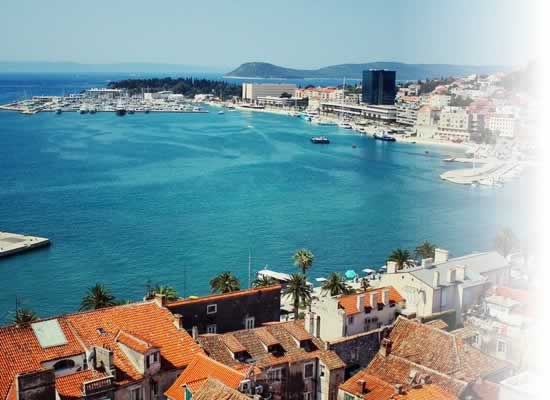
Starting and ending in Split, this cruise will take you to Makarska, Mljet, Dubrovnik, Trstenik, Korcula, Hvar and Brac!
Dates & pricing »
From Dubrovnik:
- Dubrovnik Discovery - discover top destinations near Dubrovnik
- Southern Pearls - one-way cruise from Dubrovnik to Split
- Luxury at Sea - one-way luxury cruise from Dubrovnik to Split
- Dubrovnik to Trogir - charming 8-day sailing trip from Dubrovnik to Trogir
- Adventure Sailing - kayaking, snorkeling, cycling and more in this active sailing adventure
Top rated: Dubrovnik Discovery
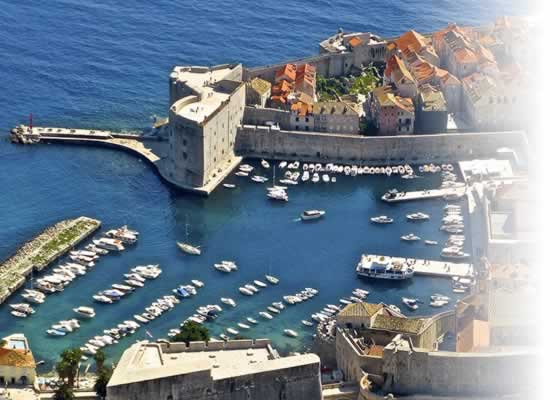
Depart from Dubrovnik on a week long cruise and explore Mljet, Hvar, Korcula, Trstenik, and Sipan.
More departure ports:
One-day sailing trips:.
- From Dubrovnik
- View all Croatia 1-day sailing trips
Organized tours are excellent ways to explore my beautiful country, and I highly recommend taking at least one trip during your visit. There are limitless fascinating places to see, and you can easily book a tour or day trip from my trusted partners below.
Below are five top rated tours from Split!
Discover more trip ideas:
- Top day trips from Split (my article)
- More tours from Split (100+)
- Tours from Dubrovnik (70+)
- See all tours in Croatia »
- Browse more tours on Viator (200+)
Find transfers and compare prices on:
- SoloTransfers (best prices from Split)
- HappyToVisit
- From Split airport
- From Split city
- From Dubrovnik airport
- From Dubrovnik city
From Any Location:
- Select any pickup and dropoff - from and to 200+ destinations in Croatia.
- From Split to Dubrovnik
- From Dubrovnik to Split
- From Split to Dubrovnik (shared transfer, special offer for only €55)
- From Dubrovnik to Split (shared transfer, special offer for only €55)
More options:
- Hire a private chauffeur (from €166/day)
- Rent a car on AutoEurope (from €40/day)
- Rent a car on RentalCars.com (price comparisons)
Cruises are fantastic and inexpensive way to discover multiple destinations in Croatia.
Split to Dubrovnik Cruise
8 days, 9 destinations
From Dubrovnik to Sipan or Slano, Mljet, Korcula, Bisevo, Vis, Hvar, Bol (Brac island), Makarska, Pucisca (Brac), Omis, and Split
€ 425 - 890
(€ 53 - 111 per day)
Dalmatian Islands Experience Cruise
From Split to Omis or Pucisca (Brac island), Korcula, Lastovo, Green cave (Ravnik), Komiza, Blue cave (Bisevo), Stari Grad (Hvar), Bol (Brac island)
€ 615 - 890
(€ 76 - 111 per day)
Split to Dubrovnik Luxury Cruise
From Split to Bol (Brač island), Hvar, Vis, Korčula, Mljet, Slano and Ston, Dubrovnik
€ 1260 - 1360
(€ 157 - 170 per day)
- ← From Budapest to Dalmatian Coast Tour
- Budget Tips For Travelers →
Pero is Splitgg's founder who was born and lived in Split most of his life. His passion for traveling and immense experience from working in tourism industry encouraged him to write many of our expert Split travel guides. More about our authors »
You May Also Like

Cheap Flights to Split

Finding Best Split Hostels

Luxury Cruise Adventure from Split
Currency converter.
Try my free currency converter:
HRK = Hrvatska Kuna - Croatian Kuna
From: HRK GBP EUR USD CAD AUD SGD EGP ARS BBD BRL CLP CNY CZK DKK XCD EEK HKD HUF ISK INR IDR ILS JMD JPY LVL LBP LTL MYR MXN NAD NPR NZD NOK OMR PKR PAB PHP PLN QAR RON RUB SAR ZAR KRW LKR SEK CHF THB TRY VEF
To: HRK GBP EUR USD CAD AUD SGD EGP ARS BBD BRL CLP CNY CZK DKK XCD EEK HKD HUF ISK INR IDR ILS JMD JPY LVL LBP LTL MYR MXN NAD NPR NZD NOK OMR PKR PAB PHP PLN QAR RON RUB SAR ZAR KRW LKR SEK CHF THB TRY VEF
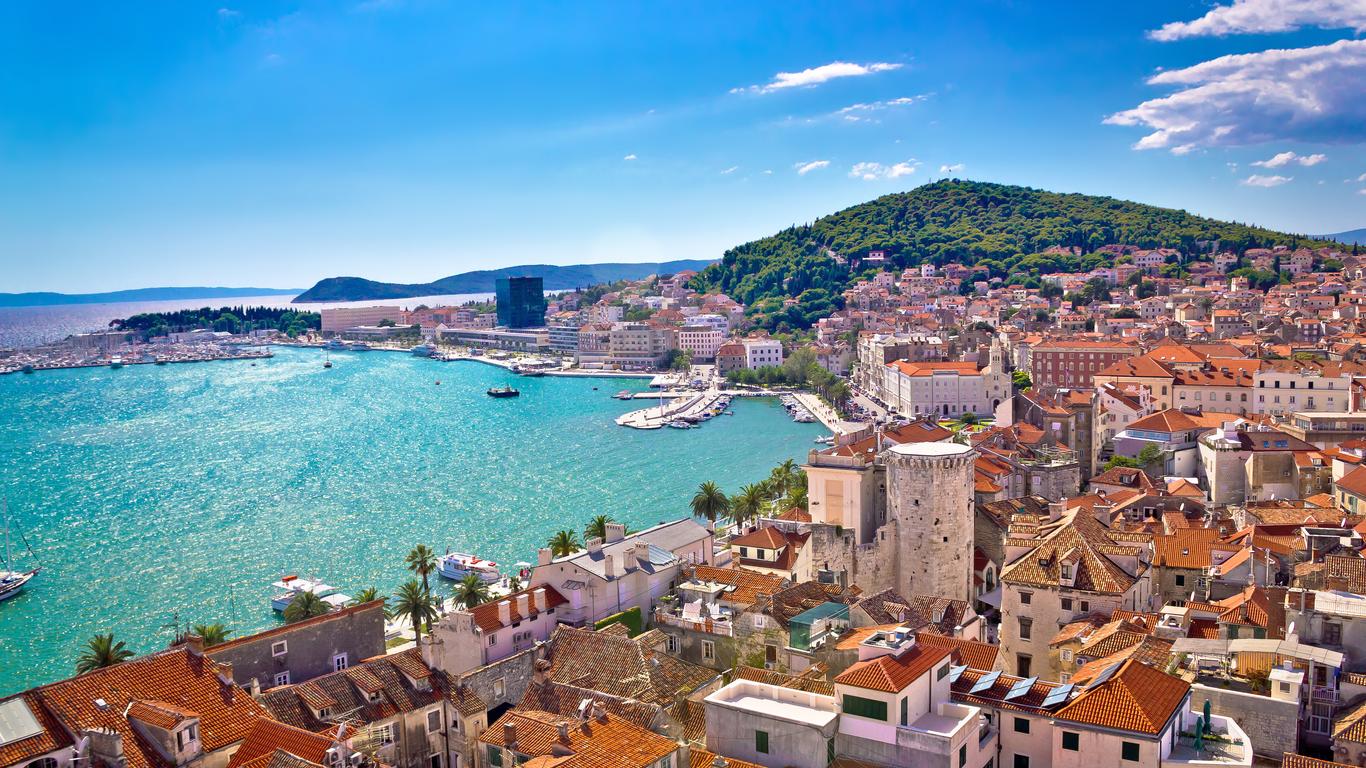
$48 Find cheap flights from Budapest to Split
This is the cheapest one-way flight price found by a kayak user in the last 72 hours by searching for a flight from budapest to split departing on 7/14. fares are subject to change and may not be available on all flights or dates of travel. click the price to replicate the search for this deal., search hundreds of travel sites at once for deals on flights to split.
Save 21% or more Compare multiple travel sites with one search.
Track prices Not ready to book? Create a price alert for when prices drop.
Filter your deals Choose cabin class, free Wi-Fi and more.
Bundle and save Save money when you bundle your flight + hotel.
Cheap flight deals from Budapest to Split (BUD-SPU)
Recent round-trip flight deals from budapest to split, recent one-way flight deals from budapest to split, recent last minute flight deals from budapest to split, recent direct flight deals from budapest to split, cheap bus & train deals from budapest to split, all round-trip flight deals to split, flights from budapest to split - travel insights & trends, get data-powered insights and trends into flights from budapest to split to help you find the cheapest flights, the best time to fly and much more., which airlines provide the cheapest flights from budapest to split, in the last 72 hours, the best return deals on flights connecting budapest to split were found on air serbia ($212) and easyjet ($245). air serbia proposed the cheapest one-way flight at $101., good to know, when to book flights from budapest to split, faqs for booking flights from budapest to split, what is the cheapest flight from budapest to split.
In the last 3 days, the lowest price for a flight from Budapest to Split was $48 for a one-way ticket and $146 for a round-trip.
Do I need a passport to fly between Budapest and Split?
A passport is required to fly from Budapest to Split.
Which aircraft models fly most regularly from Budapest to Split?
We unfortunately don’t have that data for this specific route.
Which airline alliances offer flights from Budapest to Split?
SkyTeam, and Star Alliance are the airline alliances operating flights between Budapest and Split, with Star Alliance being the most commonly used for this route.
How does KAYAK find such low prices on flights from Budapest to Split?
KAYAK is a travel search engine. That means we look across the web to find the best prices we can find for our users. With over 2 billion flight queries processed yearly, we are able to display a variety of prices and options on flights from Budapest to Split.
How does KAYAK's flight Price Forecast tool help me choose the right time to buy my flight ticket from Budapest to Split?
KAYAK’s flight Price Forecast tool uses historical data to determine whether the price for a flight to Split from Budapest is likely to change within 7 days, so travelers know whether to wait or book now.
What is the Hacker Fare option on flights from Budapest to Split?
Hacker Fares allow you to combine one-way tickets in order to save you money over a traditional round-trip ticket. You could then fly to Split with an airline and back to Budapest with another airline. Booking your flights between Budapest and SPU can sometimes prove cheaper using this method.
What is KAYAK's "flexible dates" feature and why should I care when looking for a flight from Budapest to Split?
Sometimes travel dates aren't set in stone. If your preferred travel dates have some wiggle room, flexible dates will show you all the options when flying to Split from Budapest up to 3 days before/after your preferred dates. You can then pick the flights that suit you best.
Top airline flying from Budapest to Split
The crew was attentive but not intrusive, and was always kind in every interaction.
Austrian was not the issue. Kayak was terrible The flight was canceled. Frustrating but it can happen. The worst was Kayak's customer support around re-booking. I have chatted with a bot, than with a person who insisted the flight was still on as originally booked. while chatting i went on Austrian web page and told the kayak chat lady that the flight is shown as cancelled. She said she will escalate this and that someone will contact me within the hour. When I have asked her to give me the details of the flight she sees, She gave me the general A to B and return B to A. Totally unhelpful. After two hours I contacted them again, They were still saying the original flight is as scheduled and when I explained again I was told I will be contacted within 2-6 hours. NO ONE CONTACTED ME EVER SINCE! I have than contacted Austrian directly and was rebooked on a difficult flight. Kayak continued to send me irrelevant updates about my original flight. Terrible customer service at time of need.
Austrian airline they cancel my fight , and the couldn’t give me flight , they said only available flight 4th and after , I sacked for refund, even from you KYAK , and tell now no any refund , because what happened I lost more money because I have to stay in hotel and then I buy new ticket
Management and staff att viena wasn’t professional,and they are not good by how to communicate and solve the problem, I was shocked , as I know Austrian airlines was amusing Thank you
I bought the ticket a month before my flight but checked in couple hours before my flight and had to wait seat assignment just before take off. On top of that there was not enough room in the overhead bin for my luggage.
The baggage arrived damaged and i spent EUR 300 on the baggage a month ago. No responsibility from airline or the handles.
The flight was late. We accommodated other missed flights, and the plane was full of people, without space to store carry-on luggage. They lost our checked luggage for the entire flight and delivered it after two days.
There were a number of passengers scheduled to transfer to the flight from Vienna to Warsaw. None of them made it because the crew failed to assist them in getting to the gate for the Warsaw bound flight in time. It could have been done very easily with proper assistance.
Flight attendants were awful, very rude and inconsiderate for mothers with small infants traveling.
I been flying with Austrian for few years, they never failed me.
Book cheap flights from Budapest to Split
Recent one-way flight deals, search by stops, search by airline, search by price, last minute flights from budapest to split, last minute flight, train and bus deals, budapest - split flights.
Budapest (undefined) Hungary
Destination:
Split (SPU) Croatia
Return flight deals:
Split - Budapest
Cabin classes:
Browse origins:.
- Flights »
Browse destinations:
- Worldwide »
Compare transportation modes for Budapest to Split
- train tickets
Budapest to Split by train
Travel from Budapest (Hungary) to Split (Croatia) by train (488km): schedule and information to the train connection. Compare fares and buy your ticket.
To travel by train from Budapest in Hungary to Split in Croatia, use a connection of the main route from Budapest to Zagreb.
There are two main routes. Compare them and decide which one feeds your needs best.
1 Budapest (Hungary) - Split (Croatia)
2 budapest (hungary) - zagreb (croatia) - split (croatia).

The following links could be interesting for you.
train connections : popular connections travelled by other users
1a Travelling from Budapest (Hungary) to Split (Croatia)
Travel from Hungary to Croatia by direct day train. The journey time on the travel route from Budapest to Zagreb is eight hours. Buy saver fare tickets from 19 EUR. In the summer months, Hungarian railways MAV offer night trains from Budapest to Rijeka and Split. In Croatia you have a daily night train connection from Zagreb to Split. Dubrovnik is only accessible from Split by bus. Find the exact train schedules for your travel journey and buy your train tickets via the given booking websites. The train tickets are also available at a station.
Where to buy a ticket from Budapest to Split?
Online shop for train tickets of the Hungarian State Railways MAV Start.
Cheap train tickets! Buy your train ticket online on Omio. The easy to use booking system with very good prices and e-tickets.

Online tickets from Croatian Railways HZ.
Interrail/Eurail celebrates its 50th anniversary. Get 10% discount now! --> Make your journey easier: buy only one Interrail or Eurail pass instead of several train tickets. Save your time and money!
train types: Train types you are likely to travel with. InterCity (IC) / Györsvonat (G)
night train: Night trains that might be suitable for this trip. G1204 Budapest - Split / G1246/1605/481 Budapest - Rijeka
train company: MÁV Magyar Államvasutak - MÁV START / HŽ Hrvatske željeznice
train connections: popular connections travelled by other users Split - Budapest / Budapest - Zagreb / Budapest - Rijeka / Budapest - Dubrovnik
search for train schedules here: Online timetable information, on which you can find relevant, up-to-date connections. rail.cc Deutsche Bahn
The route consist of more than one step. You have to buy several train tickets.
2a Travelling from Budapest (Hungary) to Zagreb (Croatia)
Where to buy a ticket from budapest to zagreb.
train connections: popular connections travelled by other users Zagreb - Budapest / Budapest - Split / Budapest - Rijeka / Budapest - Dubrovnik
2b Travelling from Zagreb (Croatia) to Split (Croatia)
Travel from Zagreb to Split by train. You can travel by day train or by overnight train. The journey time is 6:10 hours. The ticket price starts at 99 HRK (14 EUR). 1) Travel by day train from Zagreb to Split. There are two train connections per day. You travel by ICN train with air-condition. It is a very scenic route with rivers, lakes and mountains. The ticket price starts at 99 HRK (14 EUR). A seat reservation is required and included in the ticket price (1 EUR). The departure time in Zagreb is 07:35 (only June to September) and 15:20. The arrival time in Split is 13:50 and 21:30. 2) The overnight train from Zagreb to Split. The departure time in Zagreb is 23:05. The arrival time in Split is 07:05. The ticket price starts at 120 HRK. The night train offers the following service categories: - standard seat in 2nd class - shared compartments with 6 beds - private compartments with 3, 2 or 1 bed
Where to buy a ticket from Zagreb to Split?
Our recommendation! Buy your train ticket or bus ticket at 12go. Compare ticket prices from different companies on this travel connection.
Infobus.eu offers a simple booking system for TRAIN tickets in Ukraine and Russia and to bordering countries. Also bus tickets for a lot of international connections all over Europe. Note: for some destinations use the local spelling: MOSKVA for MOSCOW, PEKIN for BEIJING, PARIZH for PARIS.
train types: Train types you are likely to travel with. InterCity Nagibni (ICN) / Brzi (B)
night train: Night trains that might be suitable for this trip. B821 Zagreb - Split / B820 Split - Zagreb
train connections: popular connections travelled by other users Split - Zagreb
The night train in Croatia
Travel through the backcountry, travelling by train from the capital of croatia to bosnia and herzegovina, a train journey from the croatian capital to dalmatia and the adriatic, need a cheap place to sleep we recommend booking.com, find a cheap flight compare prices on kiwi.com.

Do you have questions about the connection between Budapest and Split? Does something not work as it should? Just ask in our forum and get competent answers from our rail travel experts.

Eurail: if you want to travel this route by Eurail instead of train tickets, have a look here for reservation fees and further information.
Train Routes
- Bosnia-Herzegovina
- Czech Republic
- Netherlands
- Switzerland
- United Kingdom
about railcc : We are real travellers and offer honest and well-grounded tips and tricks for your train journey.
Train tickets
- search train route
- night train
- train company
Rail passes
- Britrail Pass
- German Rail Pass
- Swiss Travel Pass
- Renfe Spain Pass
- Balkan Flexi Pass
Travel guide
- travel tours
- train types
- train travel in ...
- ferry connections
- bus tickets
- Interrail Global Pass
- Interrail One Country Pass
- first time Interrail
- how to Interrail
- Interrail train reservations
- Interrail night trains
- Interrail ferries
- Interrail buses
- Interrail country overview
- Interrail offers and discounts
- Eurail Global Pass
- Eurail Select Pass
- Eurail ONE Country Pass
- how to Eurail
- first time Eurail
- Eurail train reservations
- Eurail night trains
- Eurail ferries
- Eurail buses
- Eurail in ...
- Eurail offers and discounts
- about railcc
We speak more than 30 languages
rail.cc is partner and friend of


Find cheap flights from Budapest to Split
Search hundreds of travel sites at once for deals on flights to split.
Save 28% or more Compare multiple travel sites with one search.
Track prices Not ready to book? Create a price alert for when prices drop.
Filter your deals Choose cabin class, free Wi-Fi and more.
Bundle and save Save money when you bundle your flight + hotel.
When to book flights from Budapest to Split
Faqs for booking flights from budapest to split, which aircraft models fly most regularly from budapest to split.
We unfortunately don’t have that data for this specific route.
How does KAYAK find such low prices on flights from Budapest to Split?
KAYAK is a travel search engine. That means we look across the web to find the best prices we can find for our users. With over 2 billion flight queries processed yearly, we are able to display a variety of prices and options on flights from Budapest to Split.
How does KAYAK's flight Price Forecast tool help me choose the right time to buy my flight ticket from Budapest to Split?
KAYAK’s flight Price Forecast tool uses historical data to determine whether the price for a flight to Split from Budapest is likely to change within 7 days, so travelers know whether to wait or book now.
What is the Hacker Fare option on flights from Budapest to Split?
Hacker Fares allow you to combine one-way tickets in order to save you money over a traditional return ticket. You could then fly to Split with an airline and back to Budapest with another airline.
What is KAYAK's "flexible dates" feature and why should I care when looking for a flight from Budapest to Split?
Sometimes travel dates aren't set in stone. If your preferred travel dates have some wiggle room, flexible dates will show you all the options when flying to Split from Budapest up to 3 days before/after your preferred dates. You can then pick the flights that suit you best.
Budapest - Split Flights
Budapest (undefined) Hungary
Destination:
Split (SPU) Croatia
Return flight deals:
Split - Budapest
Cabin classes:
Browse origins:.
- Flights »
Browse destinations:
- Worldwide »
- Croatia »
Find coaches from Budapest to Split
Easily compare and book your next trip with Busbud
Cheap buses leaving tomorrow
One passenger / one way
Bus Budapest to Split: Trip Overview
Compare bus companies.

Based on 2751 reviews, the company was rated 3.3 stars on Busbud. Travellers were especially satisfied with the ticket access and the temperature but often complained with the Wi-Fi. FlixBus ticket prices on this trip start at £30.00
Budapest to Split buses
Busbud helps you find a bus from Budapest to Split. Get the best fare and schedule, book a round trip ticket or find buses with WiFi and electrical outlets.
We make it our job to connect you with the most dependable bus companies that cover bus service from Budapest to Split.
Discover how much the bus trip from Budapest to Split will cost you. Use our filters and sorting features to find the cheapest bus tickets or luxury buses.
Information on this bus route
Where are the popular bus stations and stops in budapest and split.
Budapest, Könyves Kálmán krt. 13, 1097 Hungary
Budapest, Etele tér 11, 1115 Hungary
Budapest, Horvát Boldizsár u. 1, 1142 Hungary
Könyves Kálmán körút Straße, , die Haltestelle des Stadtverkehrs , Nr. 901, 918, 937
Nyugati tér, 1062 Budapest 6, Hungary
Obala kneza Domagoja 12, 21000, Split, Croatia
Split,, Croatia
Sustipanski put 3, 21000, Split, Croatia
Gat Svetog Duje 4, 21000, Split, Croatia
Frequently asked questions on the trip Budapest - Split
How much does a bus ticket from budapest to split cost.
The average bus ticket price from Budapest to Split is £44. The best way to find cheap bus tickets from Budapest to Split is to book your tickets as early as possible. Prices tend to rise as your travel date approaches, so book in advance to secure the best prices!
How long is the bus ride from Budapest to Split?
The average travel time between Budapest and Split is around 11h 30m, although the fastest bus will take about 9h 5m. This is the time it takes to travel the 303 miles that separates the two cities.
How many daily bus connections are there between Budapest and Split?
The number of buses from Budapest to Split can differ depending on the day of the week. On average, there are 18 on this route. Some buses run direct routes, while others have layovers. Simplify your bus trip from Budapest to Split by comparing and selecting the bus that fits your travel style and budget on Busbud.
Which bus companies travel from Budapest to Split?
When taking the bus from Budapest to Split, you can travel comfortably and safely with FlixBus.
What are the departure and arrival stations when taking the bus from Budapest to Split?
Buses travelling between Budapest and Split leave from Népliget or Budapest Airport and arrive at Autobusni kolodvor, Vjezdu do prístavu, Sustipanski put.
Find cheapest prices for buses
Price is for a one-way ticket for one passenger and based on past searches.
To save money and be sure you have the best seat, it's a good idea to buy your bus tickets from Budapest to Split as early as possible.
You can expect to pay from £41 to £103 for a bus ticket from Budapest to Split based on the last 2 days. You can expect to find the cheapest price for the trip at £41, which is on 2024-05-19.
About Bus Travel
Bus travel tips.
Make friends with the driver. They usually know a lot about your destination and may even recommend which side of the bus to sit on to get the best views on the road between Budapest and Split!
From miles long of beauteous natural landscapes to impressive man-crafted sights, you’re bound to be in for a visual treat on your bus trip from Budapest to Split.
Buses have the smallest carbon footprint of all motorized transport modes. A bus going from Budapest to Split will emit half the CO2 emitted by a train, and radically less than a car or an airplane.
Create your own real life musical score by curating a personalized bus travel playlist - the perfect accompaniment to your bus ride from Budapest to Split.
Did you know?
It takes 27 hours to go by bus from Lima to Cusco, one of the craziest bus trips on the world. This route is used daily by locals and backpackers.
One of the longest bus route in the world goes all the way from Ontario to Alberta in Canada (with the same bus). This trip is 3,435 km or 2,135 miles long and the price is a bit under $100.
Did you know that 80% of the buses in North America are equipped with WiFi and power outlets ? And 60% of bus travellers have used their electronic device on board during 2014.

What's the cheapest way to go from Budapest to Split?
The best way to travel between Budapest and Split is by bus. By choosing the bus, you'll get to save some money as you travel to your destination, as ticket prices cost £44 on average. If you're on a budget, you'll find cheap tickets from £30. If you're looking for the fastest way to get to Split, choose the bus, as it will take you from Budapest to Split in about 11h 30m – that's the fastest way to get there!
Will you be returning to Budapest by bus?
You can also go to split by train, top travelled bus routes.

Why choose Busbud?
The best way to book bus and train tickets.
Busbud helps you easily search, compare and book intercity bus tickets on a worlwide scale with our comprehensive list of bus routes and schedules. With Busbud, wherever you go, you have a worldwide bus station within reach and available in your own language and currency. Busbud partners with safe and reliable bus companies throughout the world such as Greyhound, Eurolines, ALSA, OUIBUS (BlaBlaBus), National Express and many others so you can buy tickets without a worry.
Popular Buses Connecting Budapest
Buses leaving from budapest.
- Bus from Budapest to Istanbul
- Coach Budapest - Belgrade
- Bus Budapest - Milan
- Budapest - Krakow
- Bus from Budapest to Barcelona
- Coach Budapest - Rome
- Bus Budapest - Balatonfüred
- Budapest - Hajdúszoboszló
- Bus from Budapest to Nyíregyháza
- Coach Budapest - Békéscsaba
- Bus Budapest - Hegyeshalom
- Budapest - London
- Bus from Budapest to Cluj-Napoca
- Coach Budapest - Prague
- Bus Budapest - Ljubljana
Buses Going to Budapest
- Bus from Prague to Budapest
- Coach Milan - Budapest
- Bus Zagreb - Budapest
- Bucharest - Budapest
- Bus from Vienna to Budapest
- Coach Athens - Budapest
- Bus Mosonmagyaróvár - Budapest
- Siófok - Budapest
- Bus from Miskolc to Budapest
- Coach Nagykanizsa - Budapest
- Bus Balatonfüred - Budapest
- Nyíregyháza - Budapest
- Bus from Hegyeshalom to Budapest
- Coach Békéscsaba - Budapest
- Bus London - Budapest
Popular Buses Connecting Split
Buses leaving from split.
- Bus from Split to Zagreb
- Coach Split - Zadar
- Bus Split - Mostar
- Split - Trogir
- Bus from Split to Ston
- Coach Split - Starigrad
- Bus Split - Makarska
- Split - Rijeka
- Bus from Split to Brela
- Coach Split - Omiš
- Bus Split - Pula
- Split - Šibenik
- Bus from Split to Novalja
- Coach Split - Seget Donji
- Bus Split - Baška Voda
Buses Going to Split
- Bus from Supetar to Split
- Coach Rijeka - Split
- Bus Korčula - Split
- Makarska - Split
- Bus from Barcelona to Split
- Coach Trogir - Split
- Bus Pula - Split
- Baška Voda - Split
- Bus from Brela to Split
- Coach Novalja - Split
- Bus Šibenik - Split
- Orebić - Split
- Bus from Tučepi to Split
- Coach Seget Donji - Split
- Bus Vodice - Split
Popular routes in this country
- Bus from Győr to Budapest
- Coach Budapest - Keszthely
- Bus Budapest - Szeged
- Debrecen - Budapest
- Bus from Hajdúszoboszló to Budapest
- Coach Pécs - Budapest
- Bus Keszthely - Budapest
- Budapest - Mosonmagyaróvár
- Bus from Keszthely to Győr
- Coach Budapest - Tatabanya
- Bus Budapest - Siófok
- Tatabanya - Budapest
- Bus from Pécs to Szeged
- Coach Budapest - Sopron
- Bus Sopron - Budapest
Popular airport transfers
- Budapest to Budapest Airport
- Budapest to Vienna Airport
- Budapest to Bratislava Airport
Interested in more? Receive travel deals, trip reminders and other updates by email!

Cheap bus tickets from Budapest to Split
Health and safety, comfort on board, largest bus network in europe, travel environmentally-friendly, on this page, bus stations and stops in budapest.
View this address on Google Maps
Budapest Kelenföld bus station
Budapest mexikói út, bus stations and stops in split, split bus station, discover all destinations, frequently asked questions.
No, you don't need to print your ticket if you purchased it online or via the app. Simply show the driver the QR code that you received via email or that is stored in the app and you're ready to travel from Budapest to Split. It's that easy!
The earliest FlixBus ride from Budapest to Split departs at 08:00.
There are 3 bus stations in Budapest; Budapest, Budapest Kelenföld bus station, Budapest Mexikói út. You can find the location of the stations on the map on this page.
There is one bus station in Split; Split bus station. You can find its location on the map on his page.
Traveling by bus from Budapest to Split is one of the most environmentally-friendly options available as it reduces traffic associated emissions, and passengers can offset their carbon emissions when they travel with FlixBus by clicking the CO₂ compensation box when booking their ticket.
The latest FlixBus ride from Budapest to Split departs at 23:59.
FlixBus buses traveling from Budapest to Split offer extra legroom, private outlets, and restrooms. Most buses also provide free Wi-Fi.
Passengers traveling from Budapest to Split can bring one checked luggage and one piece of hand luggage for free. If you want to carry additional or special luggage, you can check all the options available on this page .
We offer several payment methods for purchasing your ticket from Budapest to Split securely. You can choose among card payment, PayPal, Google Pay and many more. Once in the payment section, you will be able to see all the available options and pick your preferred one. If you are having difficulties with payment, check out our help page about payments . If you buy your bus ticket onboard or at a sales point you are also given the option to pay cash.
You can bring your bike on FlixBus from Budapest to Split subject to availability. You can find the prices for bikes here .
You can get from Budapest to Split for as little as 49,00 €. Take advantage of our best deals on FlixBus tickets by traveling off-peak and during the week. You can buy your ticket from Budapest to Split most easily on this website or in the app .
When traveling from Budapest to Split, you can track your bus location on our Real-Time Bus Tracker . Just select the relevant bus stop and check the time of arrival. Find out where your bus is and check if there are delays on the route.
Yes, all FlixBus buses from Budapest to Split are equipped for passengers with reduced mobility. We strive to make our buses as comfortable and accessible as possible for people with disabilities and limited mobility. Service animals are allowed on board all FlixBus buses traveling from Budapest to Split. The transportation of wheelchairs, foldable wheelchairs, walking aid and other assistive mobility devices is free of charge.
The price of a children's bus ticket from Budapest to Split depends on the age of the child and the time of booking. Children under the age of 15 receive a discount on the regular adult fare. At the time of booking, we calculate the cheapest price for you from all available rates and discounts. If the discounted price is lower than the child fare, the selected passengers pay the same price. Please, make sure you check our child travel and seat policy . Strollers and foldable pushchairs (width + length + height = max 240 cm) can be transported in the luggage compartment of the bus free of charge.
Looking for bus tickets from Budapest to Split?
Discover more popular bus connections.
- Vienna - Budapest
- Budapest - Vienna
- Budapest - Prague
- Budapest - Bratislava
- Bratislava - Budapest
- Prague - Budapest
- Budapest - Zagreb
- Zagreb - Budapest
- Munich - Budapest
- Budapest - Kraków
- Budapest - Munich
- Kraków - Budapest
- Budapest - Ljubljana
- Budapest - Warsaw
- Budapest - Berlin
- Budapest - Belgrade
- Berlin - Budapest
- Ljubljana - Budapest
- Budapest - Vienna Airport
- Vienna Airport - Budapest
- Zagreb - Split
- Split - Zagreb
- Zadar - Split
- Split - Dubrovnik
- Split - Zadar
- Dubrovnik - Split
- Budapest - Split
- Split - Imotski
- Split - Budapest
- Vienna - Split
- Plitvička Jezera - Split
- Split - Mostar
- Split - Makarska
- Split - Metković
- Munich - Split
- Split - Plitvička Jezera
- Ljubljana - Split
- Split - Skradin
- Split - Rijeka
- Split - Vrgorac
Onboard services are subject to availability

These Are The Cheapest Places To Travel In Europe All Year Round
- Prague, Krakow, and Budapest are affordable European destinations with plenty of attractions, cheap accommodation, and vibrant nightlife.
- Valencia, Riga, and Split offer budget-friendly options, including stunning beaches, historical sites, and affordable local cuisine.
- Sofia, Istanbul, Bucharest, and Palermo are also cheap year-round destinations in Europe with a range of attractions, from historic landmarks to vibrant markets.
Vacationing in Europe is expensive, but it doesn't always have to be. For every costly city, a handful of cheaper alternatives offer equal charm and beauty but at a much more affordable price. Know this: There are plenty of affordable European destinations year-round to enjoy without breaking the bank. But how can one know which spot to choose?
For budget-minded travelers, a little research goes a long way. Factoring costs for flights, accommodation, transportation, popular attractions, local cuisine, and evening drinks must be considered. Choose wisely, and travelers might just get the European vacation of their dreams.
From delicious dinners and amazing architecture to rich histories, beautiful beaches, castles, gardens, and (free!) museums, Europe is the perfect getaway for any price point. Here are the cheapest European destinations that are cheap all year .
Related: 10 Cheap Small Towns That Offer Fast WiFi & Are Great For Remote Work
Prague, Czech Republic
Prague's history includes invasions, floods, fires, and failed overthrows. The storied city has a reputation for survival and perseverance, and a visit to the Czech capital is fascinating. Full of charming churches and narrow streets, famous sites include the Charles Bridge and the hilltop Prague Castle. And the city's center is a UNESCO World Heritage Site.
Many attractions offer free admission, hotels are much cheaper than neighboring countries, and a vibrant nightlife (including Prague's renowned beer) offers low prices. And to top it off - airfare is also quite reasonable. A trip to Prague is a great idea for those looking to enjoy travel for cheap .
- Top attractions in Prague: Charles Bridge, Prague Castle, Wenceslas Square, Museum of Senses, and the National Museum.
- Best time to visit Prague: Offering sunny weather and fewer crowds, both spring and fall are wonderful times to visit Prague.
Krakow, Poland
Kraków is famous for its interesting past and its Main Square in the Old Town. It's quite affordable, especially when opting for street food, like the Maczanka sandwich from Andrus Foodtruck or the Zapiekanka from Plac Nowy.
Krakow is easy to explore.
The Old Town takes 20 minutes to experience, but stay longer to really appreciate everything it has to offer. When visiting Krakow, definitely visit two top Polish attractions: the Wieliczka Salt Mine, a cathedral carved out of salt, and the infamous Auschwitz-Birkenau State Museum.
- Top attractions in Krakow: Krakow's Rynek Glowny Central Square, the Stare Misato neighborhood, St. Mary's Basilica, Wawel Royal Castle, and the Auschwitz-Birkenau State Museum
- Best time to visit Krakow: Summer is best for festival-goers and warm-weather lovers. Spring and fall are best for tourists looking to explore Krakow without throngs of tourists.
Budapest, Hungary
Budapest dates back to the Old Stone Age, and it's one of the cheapest places to travel in Europe. It's split by the Danube River and comprises three main areas – Pest, Buda, and Óbuda. Beautiful Budapest is full of fascinating history and impressive buildings, showcasing everything from Roman, neo-Gothic, Renaissance and Ottoman architecture.
Budapest is also an excellent option for travelers looking for a lively nightlife. Top attractions include Budapest's famous Buda Castle , thermal baths, Fisherman's Bastion, Heroes' Square, free tours of the Parliament, and especially the National Gallery. Prices in Budapest are fair enough that travelers can choose multiple attractions, dine at delicious restaurants, and dance the night away at the many nightclubs.
- Top attractions in Budapest: Buda Castle, Hungarian Parliament Building, Fisherman's Bastion, Shoes on the Danube Bank, St. Stephen's Basilica, and Memento Park.
- Best time to visit Budapest: May, June, and early October. Mild weather, inexpensive accommodations, and fewer crowds make these months ideal. September tends to be expensive for hotels as it's a popular time of year for conventions.
Valencia, Spain
While some Spanish cities can be a bit pricey, Valencia offers ample opportunities for cheap activities and attractions. Valencia is known for its Old Town, the Central Market (one of the oldest food market areas in Europe), the City of Arts and Sciences, and the Valencia Cathedral. But it has even more to offer.
The beaches are stunning, local food is affordable, and the art scene is impressive. The city's best street art is found in El Carmen, the oldest neighborhood in Valencia. Graffiti murals date back to the 1980s, and some have become quite famous, like "The Triumph of Death" and "The Three Graces."
- Top attractions in Valen cia : Oceanogràfic Valencia, City of Arts and Sciences, Catedral de Valencia, Bioparc Valencia, and the Museo de Bellas Artes.
- Best time to visit Valencia: Valencia is warm most of the year, but May and October are when the city really shines.
Related: 10 Cheap Hotels in Spain That Offer Unbeatable Value & Comfort
Riga, Latvia
Riga, Latvia, is another cheap European destination. With many budget-friendly attractions, like Riga Castle, the Freedom Monument, and St. Peter's Church, local cuisine is also served at affordable prices. The free self-guided Art Nouveau tour is not to be missed.
Showcasing early 20th-century architecture and some of Europe's most impressive buildings, the walking tour combines unique sights with stories. Riga is home to the world's highest concentration of Art Nouveau structures.
- Top attractions in Riga: The Old City, House Of The Black Heads, Central Market, Town Hall Square, and the KGB Building.
- Best time to visit Riga: Summer. Peak season brings hot weather and good deals.
Split, Croatia
Nestled on the Adriatic Sea in Central Croatia, Split is known for its historic Old Town and pristine beaches. Spending the day on the sand, splashing in the surf, or wandering the cobblestone streets doesn't cost a penny. Top attractions include Diocletian Palace, a medieval fortress, a forest park, art galleries, museums, and plenty of fresh seafood and local wine.
There is so much to do and see in Split, Croatia . And a visit to this gorgeous seaside town doesn't have to cost a fortune.
- Top attractions in Split: Old Town, Palazzo di Diocleziano, Marjan Park, Cathedral of Saint Domnius, and Diocletian's Palace.
- Best time to visit Split: Spring and fall are cheaper than summer and still offer warm Mediterranean weather.
Related: 10 Best Cheap Hotels In London For An Affordable And Memorable Stay
Sofia, Bulgaria
Possibly the cheapest place to buy food and drinks in Europe, a trip to Sofia is ideal for penny pinchers. Accommodations are affordable. There are plenty of cheap boutique hotels, hostels, and even 5-star stays can be found for under $200 per night. History buffs will love the Sofia History Museum, Boyana Church and Alexander Nevsky Cathedral.
Culture lovers will appreciate the National Gallery for Foreign Art and the Bulgarian National Theatre. There's also plenty of green space and a very vibrant nightlife.
- Top attractions in Sofia: Vitosha Boulevard, St. Alexander Nevski Cathedral, Saint Nikolas Russian Church, and Boyana Church.
- Best time to visit Sofia: Fall is best for great prices and pleasant weather.
The SoFun Bulgaria Discount Card (a little over $5) offers food, shopping, and attractions discounts.
Istanbul, Turkey
The exchange rate for Western travelers visiting Istanbul keeps this enchanting city affordable. With plenty of free attractions, Istanbul is truly ideal for those on a budget. One main attraction, the iconic Sultanahmet Square, is set in the center of the historic Old Town. And entry is free to many important religious landmarks, like the Blue Mosque, Hagia Sophia, and Süleymaniye Mosque. To really see Istanbul's colorful atmosphere, take a stroll through the Grand Bazaar.
When travelers get hungry in Istanbul, there are plenty of affordable options. Street food, like kebabs, is cheap and delicious. To top it off, hotels and transportation around the city are inexpensive. Istanbul has it all — food, culture, and sightseeing .
- Top attractions in Istanbul: Hagia Sophia Mosque, Basilica Cistern, Suleymaniye Mosque, Topkapi Palace, and the Blue Mosque.
- Best time to visit Istanbul: Winter is the cheapest time to visit Istanbul but for tourists looking to avoid the chill, consider spring and fall. Like many European countries, summer is the most expensive time to travel.
Bucharest, Romania
In the early 1900s, Bucharest was nicknamed "Little Paris." The largest city in Romania, Bucharest is known for its Belle Époque buildings and wide, tree-lined streets. But this gorgeous city is also an affordable European destination for budget-friendly travelers. In fact, it's one of the continent's best cheap cities to visit. And it's been one of Europe's cheapest capital cities for decades.
A stroll through Old Town is free, entertaining, and mesmerizing. Balance along the cobblestone streets to witness famous landmarks such as the People's Palace and the Stavropoleos Church. Art lovers will appreciate the many museums, such as the National Museum of Art and the Museum of Romanian Peasants.
- Top attractions in Bucharest: Stavropoleos Monastery, Herăstrau Park, Palace of Parliament, and Muzeul Naţional al Satului "Dimitrie Gusti."
- Best time to visit Bucharest: Peak season is June and July. For budget-friendly travelers who don't mind the cold weather, travel to Bucharest in January.
Related: Bucharest, Romania: The Perfect Backdrop For The Creepy And Mysterious 'Wednesday' Series
Palermo, Italy
The capital of Sicily is perfect for budget-friendly vacations. One of the largest cities in the Mediterranean, the scenery is stunning, and the city's history is fascinating — it's one of the most conquered locations in the world.
From affordable outdoor activities, like spending the day at the beach, to hiking or strolling along the town's cobblestone streets, there are tons to see and do in this small city. Spending a day browsing the central Ballarò Street market and the Vucciria market are more fun, cheap options!
- Top attractions in Palermo : Beautiful beaches, Cattedrale di Palermo, Norman Palace, Teatro Massimo, and Santa Maria dell'Ammiraglio.
- Best time to visit Palermo: Summers in Palermo are beautiful but expensive. The cheapest month to visit is March.
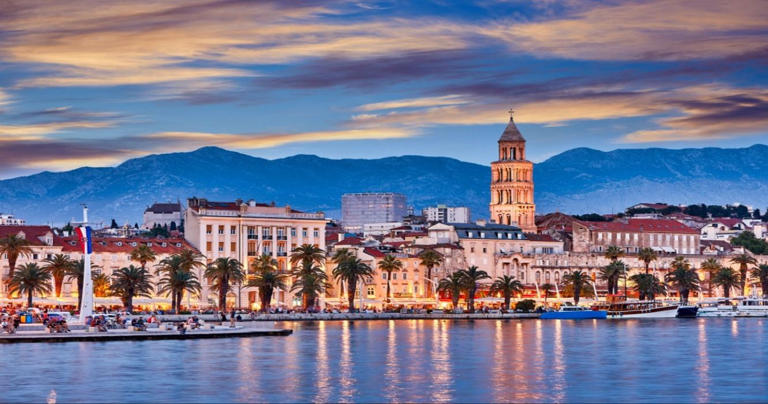
- History & facts
- Famous people
- Famous places
- Science & nature
- Tech & business
- Entertainment
- Tech & Science
Everyone here is Barbie! Exclusive Barbie Collection Arrives in Budapest

Beatrice Je
Ever since the introduction of barbie on March 9, 1959, this iconic Barbie doll continues to pave its own way within society and is now the centre of a exhibitions all over the world. Budapest has not been left out as from May 13 to May 31, 2024 The Dobay BudaPart hallways will be adorned with a magnificent display of Joó Beatrix Barbie dolls, created especially for the 65th anniversary as reported by Hungary Today .
This is the best location for the barbie display not only because of the artistic element of the shop or its accessibility but also the fact that Dobay BudaPart’s Confectionery and Bakery will be serving really sweet and special Barbie-themed delicacies to go along with the show as Magyar Nemzet , writes.
All the dolls on display have been dressed in distinctive and appealing looks by fashion designer Beatrix Joó, who is well-known for her works at the Sentiments fashion company. She has paid close attention to every little detail, including hair bows and shoes.
Alongside 65 other accomplished Hungarian women, this special Barbie display had its debut on March 8 at the Four Seasons Hotel Gresham Palace in Budapest. According to Magyar Nemzet , due to the event’s tremendous success and praise, Mattel (owner of the Barbie brand) and Joó Beatrix decided to expand the exhibition to new cities and rural areas.

Istanbul Gears Up to Welcome the World in 2024
In a life-size Barbie box, locals and tourists can even take their own Barbie-inspired pictures! According to Beatrix Joó, the goal of this collection is to inspire and cheer up kids and adults by exhibiting beyond the imagination.
For barbie lovers don’t pass up this chance to experience the wonder of Joó Beatrix’s Barbie collection. Even if you are not a barbie fan, the collection comes in highly recommended so give it a chance, who knows, this might end up being your favourite thing to do yet.
Planning a trip to Paris ? Get ready !
These are Amazon’s best-selling travel products that you may need for coming to Paris.
- The best travel book : Rick Steves – Paris 2023 – Learn more here
- Fodor’s Paris 2024 – Learn more here
Travel Gear
- Venture Pal Lightweight Backpack – Learn more here
- Samsonite Winfield 2 28″ Luggage – Learn more here
- Swig Savvy’s Stainless Steel Insulated Water Bottle – Learn more here
Check Amazon’s best-seller list for the most popular travel accessories. We sometimes read this list just to find out what new travel products people are buying.
Related Posts

Romics Returns to Rome on April 4th: The Ultimate Celebration of Entertainment

Business , Travel
Barcelona Port Prepares for Cruise Ship Shift

Heleen’s Story of Traveling the World with Her Family and Living the Dream

French President Mulls State of Emergency for New Caledonia Amid Rising Tensions

Free Portuguese Lessons!…and Porto’s goodness

The Pavilions, Amsterdam Wins Travelers’ Choice Awards ‘Best of the Best’ for 2024
Hello & Welcome
Popular articles.

Top 20 Streets to See in Paris

Paris in two days

Top 15 Things to do Around the Eiffel Tower

The Best Way to Visit Paris Museums

Top 15 Fashion Stores in Le Marais
Visit europe with discover walks.
- Paris walking tours
- Montmartre walking tour
- Lisbon walking tours
- Prague walking tours
- Barcelona walking tours
- Private tours in Europe
- Privacy policy
© 2024 Charing Cross Corporation
More From Forbes
New olympic sporting events coming to paris.
- Share to Facebook
- Share to Twitter
- Share to Linkedin
PARIS, FRANCE - MAY 16: B-Boy Mounir of France poses in front of the Eiffel Tower during a portrait ... [+] session on May 16, 2023 in Paris, France. Breaking, a style of dance that originated in the United States in the 1970s, will make its Olympic debut at the Paris 2024 Olympic Games. (Photo by Ryan Pierse/Getty Images)
The Olympics are rooted in tradition, with the first official Summer Olympics staged in 1896 in Athens, Greece that drew athletes from 13 nations. Ever since then, the marathon has been a mainstay in Olympic programming.
But over the decades, dozens of sports have been added to the Olympics, and this year is no different, with a bevvy of competitions that should capture attention from younger viewers.
The biggest news? For the first time ever, break dancing will be an Olympic sport making its debut on the world’s main stage at the 2024 Paris Olympics this summer.
Mark your calendars: The Summer Olympics will take place from July 26 to Aug. 11 in Paris. The opening ceremony will take place along the Seine on July 26.
New Sports Featured in 2024 Paris Olympics
Breakdancing.
PARIS, FRANCE - MAY 16: B-Boy Mounir of France poses in front of the Arc de Triomphe during a ... [+] portrait session on May 16, 2023 in Paris, France. Breaking, a style of dance that originated in the United States in the 1970s, will make its Olympic debut at the Paris 2024 Olympic Games. (Photo by Ryan Pierse/Getty Images)
Breaking is an urban dance form that originated in the United States in the 1970s.
“With roots in hip-hop culture, breaking first took form in the lively block parties in the Bronx borough of New York, and is characterized by acrobatic movements, stylised footwork, and the key role played by the DJ and the MC (master of ceremonies) during battles,” according to the official Olympics site .
The Best Self-Cleaning Litter Boxes, Tested For Months
North carolina legislators want to ban masks, even for health reasons, aurora alert why you now need to pack a bag for sudden solar storms.
Break dancing won over fans in the 2018 Youth Olympics held in Buenos Aires, Argentina, with more than 1 million viewers tuning into the head-spinning, back-flipping dance competition, according to NBC Olympics. Now, it’s made its way to the main Olympic stage.
The breaking competition in the 2024 Paris Olympics will feature two events: one for men and one for women. Sixteen B-Boys and 16 B-Girls will face off in solo battles, improvising their athletic-artistic moves to the beats that DJs spin.
Both break dancing competitions will be held at Concorde, which is a popular Parisian square that’s been transformed into an open-air arena that will also host another popular urban sport — 3 v. 3 basketball.
Lookout for moves like the turtle (when a dancer spins with hands planted on the ground and legs in the air) and windmills (rotating on a shoulder with legs split in the air).
Breakdancing events will be held Aug. 9 and 10.
So far, 12 of the 32 break dancing athlete spots have been filled for the 2024 Paris Olympics, including two representing the United States. They are: Victor Montalvo and Sunny Choi .
Two more qualifying series are set, the first in Shanghai (May 16-19) and the second in Budapest (June 20-23).
Skateboarding
TOKYO, JAPAN - JULY 26: Momiji Nishiya of Team Japan competes during the Women's Street Final on ... [+] day three of the Tokyo 2020 Olympic Games at Ariake Urban Sports Park on July 26, 2021 in Tokyo, Japan. (Photo by Ezra Shaw/Getty Images)
The world’s best skateboarders will also descend on Paris for the Summer Games. Skateboarding, which took off in the U.S. in the 1950s as an offshoot of surf culture, made its Olympic debut during the 2020 Summer Games in Tokyo (which were postponed until 2021 due to the coronavirus pandemic).
It’s back for the 2024 games, also held at the Place de La Concorde in Paris.
Skateboarding has two styles of competitions: Park and street, with men and women competing in both.
The park course has a series of bowls and bends, challenging skaters to gain speed and perform mid-air tricks. The street-like course mimics an urban environment with stairs and handrails, and athletes perform tricks and are judged partly on how well they control their boards during two 45-second runs studded with five tricks.
Japan dominated in skateboarding in the Tokyo Summer games.
In the women’s competition, Sakura Yosozumi (Japan) took home the gold in the men’s park in Tokyo Olympics. Momiji Nishiya (Japan) nabbed the gold medal in the street-style competition in Tokyo.
For the men’s competition, Keegan Palmer (Australia) took home the gold in the men’s park in Tokyo Olympics. Yuto Horigome (Japan) nabbed the gold medal in the street-style competition in Tokyo.
Two Americans medaled in skateboarding: Cory Juneau took home a bronze in men’s park, and Jagger Eaton won a bronze in the men’s street.
Sports Climbing
TOKYO, JAPAN - AUGUST 04: Akiyo Noguchi of Japan during the Sport Climbing Women's Combined, ... [+] Bouldering Qualification on day twelve of the Tokyo 2020 Olympic Games at Aomi Urban Sports Park on August 04, 2021 in Tokyo, Japan. (Photo by Maja Hitij/Getty Images)
Sports climbing also took to the main stage for the first time during the Tokyo games, and it will be back in Paris for the 2024 Games as a “newish” sport. It also appeals to youth, and was among the sports that launched in 2018 at the Buenos Aires Youth Olympic Games.
According to the Olympics, there’s 25 million climbers around the world, and nearly four in 10 are under 18 years old, with youth climbing gyms and areas gaining a major foothold in the United States.
In the marquee event, climbers are tasked with climbing a 15-meter wall (about 50 feet) in six minutes without seeing the route ahead of time.
Sports climbing events will also include bouldering on a 4.5-meter wall (nearly 15 feet) with no ropes and in the fewest attempts possible.
Where Will Olympic Surfing Take Place in 2024 Olympics?
TEAHUPO'O, FRENCH POLYNESIA - AUGUST 16: Gabriel Medina of Brazil surfs a barrel wave during the ... [+] 2023 Shiseido Tahiti Pro on August 16, 2023 in Teahupo'o, French Polynesia. Teahupo'o has been hosting the WSL Tahiti Pro event for over two decades and will next year host the surfing event for the Paris 2024 Olympic Games. (Photo by Ryan Pierse/Getty Images)
The 2024 Olympics Surfing will take place over the course of four days in between July 27 and Aug. 8. But since Paris is landlocked this event will be staged in Teahupo’o, Tahiti, which is known for its superb surfing and heavy waves that can reach up to nearly 10 feet.
Surfing is also a young sport in the Olympics. It joined the lineup of Olympic sports during the Tokyo 2020 Olympic Games held in 2021, with athletes taking to the waves at Tsurigasaki Beach, Chiba Prefecture, Japan.
- Editorial Standards
- Reprints & Permissions
Join The Conversation
One Community. Many Voices. Create a free account to share your thoughts.
Forbes Community Guidelines
Our community is about connecting people through open and thoughtful conversations. We want our readers to share their views and exchange ideas and facts in a safe space.
In order to do so, please follow the posting rules in our site's Terms of Service. We've summarized some of those key rules below. Simply put, keep it civil.
Your post will be rejected if we notice that it seems to contain:
- False or intentionally out-of-context or misleading information
- Insults, profanity, incoherent, obscene or inflammatory language or threats of any kind
- Attacks on the identity of other commenters or the article's author
- Content that otherwise violates our site's terms.
User accounts will be blocked if we notice or believe that users are engaged in:
- Continuous attempts to re-post comments that have been previously moderated/rejected
- Racist, sexist, homophobic or other discriminatory comments
- Attempts or tactics that put the site security at risk
- Actions that otherwise violate our site's terms.
So, how can you be a power user?
- Stay on topic and share your insights
- Feel free to be clear and thoughtful to get your point across
- ‘Like’ or ‘Dislike’ to show your point of view.
- Protect your community.
- Use the report tool to alert us when someone breaks the rules.
Thanks for reading our community guidelines. Please read the full list of posting rules found in our site's Terms of Service.

Olympic Qualifier Series action underway in Shanghai as athletes aim to reach Paris 2024
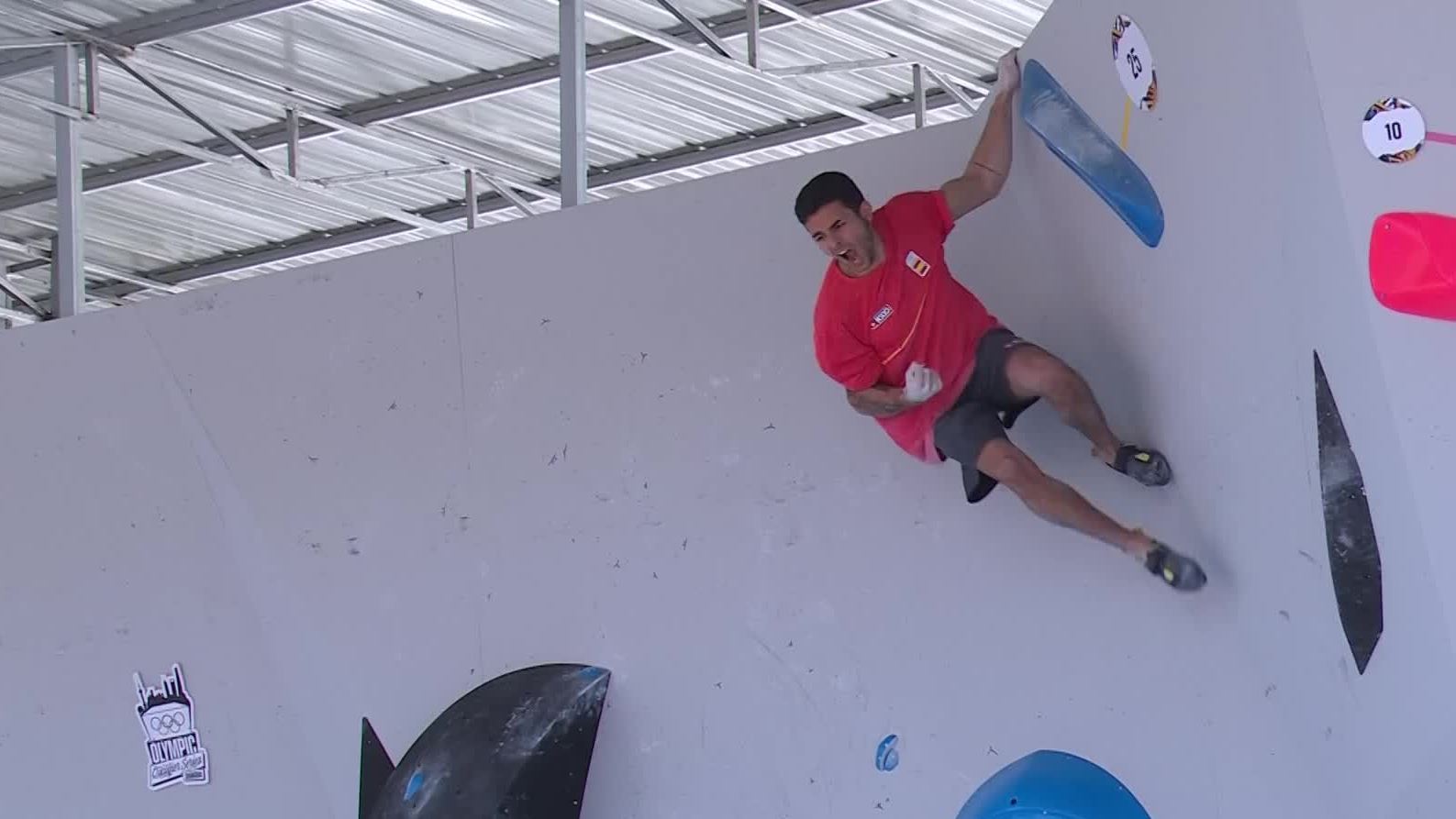
- Share full article

Can You Lose Your Native Tongue?
After moving abroad, I found my English slowly eroding. It turns out our first languages aren’t as embedded as we think.
Credit... Artwork by PABLO DELCÁN
Supported by
By Madeleine Schwartz
Madeleine Schwartz is a writer and editor who grew up speaking English and French. She has been living in Paris since 2020.
- May 14, 2024
It happened the first time over dinner. I was saying something to my husband, who grew up in Paris where we live, and suddenly couldn’t get the word out. The culprit was the “r.” For the previous few months, I had been trying to perfect the French “r.” My failure to do so was the last marker of my Americanness, and I could only do it if I concentrated, moving the sound backward in my mouth and exhaling at the same time. Now I was saying something in English — “reheat” or “rehash” — and the “r” was refusing to come forward. The word felt like a piece of dough stuck in my throat.
Listen to this article, read by Soneela Nankani
Other changes began to push into my speech. I realized that when my husband spoke to me in English, I would answer him in French. My mother called, and I heard myself speaking with a French accent. Drafts of my articles were returned with an unusual number of comments from editors. Then I told a friend about a spill at the grocery store, which — the words “conveyor belt” vanishing midsentence — took place on a “supermarket treadmill.” Even back home in New York, I found my mouth puckered into the fish lips that allow for the particularly French sounds of “u,” rather than broadened into the long “ay” sounds that punctuate English.
My mother is American, and my father is French; they split up when I was about 3 months old. I grew up speaking one language exclusively with one half of my family in New York and the other language with the other in France. It’s a standard of academic literature on bilingual people that different languages bring out different aspects of the self. But these were not two different personalities but two separate lives. In one version, I was living with my mom on the Upper West Side and walking up Columbus Avenue to get to school. In the other, I was foraging for mushrooms in Alsatian forests or writing plays with my cousins and later three half-siblings, who at the time didn’t understand a word of English. The experience of either language was entirely distinct, as if I had been given two scripts with mirroring supportive casts. In each a parent, grandparents, aunts and uncles; in each, a language, a home, a Madeleine.
I moved to Paris in October 2020, on the heels of my 30th birthday. This was both a rational decision and something of a Covid-spurred dare. I had been working as a journalist and editor for several years, specializing in European politics, and had reported across Germany and Spain in those languages. I had never professionally used French, in which I was technically fluent. It seemed like a good idea to try.
When I arrived in France, however, I realized my fluency had its limitations: I hadn’t spoken French with adults who didn’t share my DNA. The cultural historian Thomas Laqueur, who grew up speaking German at home in West Virginia, had a similar experience, as the linguist Julie Sedivy notes in “Memory Speaks,” her book about language loss and relearning her childhood Czech. Sedivy cites an essay of Laqueur’s in which he describes the first time he learned that German was not, in fact, a secret family language. He and his brother had been arguing over a Popsicle in front of the grocery store near his house:
A lady came up to us and said, in German, that she would give us a nickel so that we could each have a treat of our own. I don’t remember buying a second Popsicle, but I do remember being very excited at finding someone else of our linguistic species. I rushed home with the big news.
My own introduction to speaking French as an adult was less joyous. After reaching out to sources for a different article for this magazine with little success, I showed the unanswered emails to a friend. She gently informed me that I had been yelling at everyone I hoped to interview.
Compared with English, French is slower, more formal, less direct. The language requires a kind of politeness that, translated literally, sounds subservient, even passive-aggressive. I started collecting the stock phrases that I needed to indicate polite interaction. “I would entreat you, dear Madam ...” “Please accept, dear sir, the assurances of my highest esteem.” It had always seemed that French made my face more drawn and serious, as if all my energy were concentrated into the precision of certain vowels. English forced my lips to widen into a smile.
But going back to English wasn’t so easy, either. I worried about the French I learned somehow infecting my English. I edit a magazine, The Dial, which I founded in part to bring more local journalists and writers to an English-speaking audience. But as I worked on texts by Ukrainians or Argentines or Turks, smoothing over syntax and unusual idioms into more fluid English prose, I began to doubt that I even knew what the right English was.
Back in New York on a trip, I thanked the cashier at Duane Reade by calling him “dear sir.” My thoughts themselves seemed twisted in a series of interlocking clauses, as though I was afraid that being direct might make me seem rude. It wasn’t just that my French was getting better: My English was getting worse.
For a long time, a central question in linguistics was how people learn language. But in the past few decades, a new field of study called “language attrition” has emerged. It concerns not learning but forgetting: What causes language to be lost?
People who move to new countries often find themselves forgetting words in their first language, using odd turns of phrase or speaking with a newly foreign accent. This impermanence has led linguists to reconsider much of what was once assumed about language learning. Rather than seeing the process of becoming multilingual as cumulative, with each language complementing the next, some linguists see languages as siblings vying for attention. Add a new one to the mix, and competition emerges. “There is no age at which a language, even a native tongue, is so firmly cemented into the brain that it can’t be dislodged or altered by a new one,” Sedivy writes. “Like a household that welcomes a new child, a single mind can’t admit a new language without some impact on other languages already residing there.”
As my time in France hit the year mark and then the two-year mark, I began to worry about how much French was changing my English — that I might even be losing some basic ability to use the language I considered closest to my core. It wasn’t an idle concern. A few years earlier, when living in Berlin, I found the English of decades-long expats mannered and strange; they spoke more slowly and peppered in bits of German that sounded forced and odd. As an editor, I could see it in translators too: The more time people spent in their new language, the more their English prose took on a kind of Germanic overtone. Would the same thing happen to me?

Even languages that seem firmly rooted in the mind can be subject to attrition. “When you have two languages that live in your brain,” says Monika S. Schmid, a leader in the field of language attrition at the University of York, “every time you say something, every time you take a word, every time you put together a sentence, you have to make a choice. Sometimes one language wins out. And sometimes the other wins.” People who are bilingual, she says, “tend to get very, very good at managing these kinds of things and using the language that they want and not having too much interference between the two.” But even so, there’s often a toll: the accent, the grammar or a word that doesn’t sound quite right.
What determines whether a language sticks or not? Age, Schmid says, is an important factor. “If you look at a child that is 8, 9 or 10 years old, and see what that child could do with the language and how much they know — they’re basically fully fledged native speakers.” But just as they are good language learners, children are good language forgetters. Linguists generally agree that a language acquired in early childhood tends to have greater emotional resonance for its speaker. But a child who stops speaking a language before age 12 can completely lose it. For those who stop speaking a language in childhood, that language can erode — so much so that when they try to relearn it, they seem to have few, if any, advantages, Schmid says, compared with people learning that language from scratch. Even a language with very primal, deep connections can fade into the recesses of memory.
In her book, Sedivy cites a study conducted in France that tested a group of adults who were adopted from Korea between the ages of 3 and 8 . Taken into French homes, they quickly learned French and forgot their first language. The researchers compared these adults with a group of monolingual French speakers. The participants born in Korea could not identify Korean sentences significantly better than the French control group. Intimate moments of childhood can be lost, along with the language in which they took place.
Researchers have stressed that a first language used through later years can be remarkably resilient and often comes back when speakers return home. But even adults who move to a new country can find themselves losing fluency in their first language. Merel Keijzer, a linguist at the University of Groningen who studies bilingualism, surveyed a group of Dutch speakers who emigrated as adults to Australia. A classic theory of linguistic development, she told me, argues that new language skills are superimposed on older ones like layers of an onion. She thus expected that she would find a simple language reversion: The layers that were acquired later would be most likely to go first.
The reality was more complicated. In a paper Keijzer wrote with Schmid, she found that the Dutch speakers in Australia did not regress in the way that she predicted. “You saw more Dutch coming into their English, but you also saw more English coming into their Dutch,” she says. The pattern wasn’t simple reversion so much as commingling. They “tended to just be less able to separate their languages.” As they aged, the immigrants didn’t go back to their original language; they just had difficulty keeping the two vocabularies apart.
In “Alfabet/Alphabet: A Memoir of a First Language,” the poet Sadiqa de Meijer, who was born in Amsterdam, discusses her own experiences speaking Dutch in Canada. She worries that her language has become “amusingly formal” now that she doesn’t speak it regularly. A friend tells her that she now sounds “like a book.” Unless she is in the Netherlands, she writes: “Dutch is primarily a reading language to me now. The skill of casual exchanges is in gradual atrophy.” Her young daughter does not want to speak Dutch. “Stop Dutching me!” she says. For De Meijer, “people who speak a language they learned after early childhood live in chronic abstraction.”
This state of abstraction was one that I feared. On some level, the worry felt trivial: In a world where languages are constantly being lost to English, who would complain about a lack of contact with the language responsible for devouring so many others? The Europeans that I interviewed for work deplored the imperial nature of English; the only way to have their ideas heard was to express them in a language imposed by globalization. But what I missed was not the universal English of academics nor the language of peppy LinkedIn posts but the particular sounds that I grew up with: the near-rudeness of the English spoken in New York and its rushed cadence, the way that the bottoms of words sometimes were swallowed and cut off, as if everyone already knew what was being suggested and didn’t need to actually finish the thought. I missed the variegated vocabulary of New York, where English felt like an international, rather than a globalized language, enriched with the particular words of decades of immigrants. I began to listen to “The Brian Lehrer Show” on WNYC, a public-radio station in New York, with strange fervor, finding myself excited whenever someone called in from Staten Island.
The idea that my facility with English might be weakening brought up complicated feelings, some more flattering than others. When a journalism student wrote to ask if I would be a subject in his dissertation about “the experiences of nonnative English-speaking journalists” in media, I took the email as a personal slight. Were others noticing how much I struggled to find the right word?
A change in language use, whether deliberate or unconscious, often affects our sense of self. Language is inextricably tied up with our emotions; it’s how we express ourselves — our pain, our love, our fear. And that means, as Schmid, the language-attrition expert at the University of York, has pointed out, that the loss of a language can be tied up with emotion too. In her dissertation, Schmid looked at German-speaking Jews who emigrated to England and the United States shortly before World War II and their relationship with their first language. She sent questionnaires asking them how difficult it was for them to speak German now and how they used the language — “in writing in a diary, for example, or while dreaming.”
One woman wrote: “I was physically unable to speak German. ... When I visited Germany for 3 or 4 days in 1949 — I found myself unable to utter one word of German although the frontier guard was a dear old man. I had to speak French in order to answer his questions.”
Her husband concurred: “My wife in her reply to you will have told you that she could and did not want to speak German because they killed her parents. So we never spoke German to each other, not even intimately.”
Another wrote: “I feel that my family did a lot for Germany and for Düsseldorf, and therefore I feel that Germany betrayed me. America is my country, and English is my language.”
Schmid divided the émigrés into three groups, tying each of them to a point in Germany’s history. The first group left before September 1935, that is, before the Nuremberg race laws. The second group left between the enactment of those laws and Kristallnacht, in November 1938. The last group comprised those who left between Kristallnacht and August 1939, just before Germany invaded Poland.
What Schmid found was that of all the possible factors that might affect language attrition, the one that had a clear impact was how much of the Nazi regime they experienced. Emigration date, she wrote, outweighed every other factor; those who left last were the ones who were the least likely to be perceived as “native” speakers by other Germans, and they often had a weaker relationship to that language:
It appears that what is at the heart of language attrition is not so much the opportunity to use the language, nor the age at the time of emigration. What matters is the speaker’s identity and self-perception. ... Someone who wants to belong to a speech community and wants to be recognized as a member is capable of behaving accordingly over an extremely long stretch of time. On the other hand, someone who rejects that language community — or has been rejected and persecuted by it — may adapt his or her linguistic behavior so as not to appear to be a member any longer.
In other words, the closeness we have with a language is not just a product of our ability to use it but of other emotional valences as well. If language is a form of identity, it is one that may be changed by circumstance or even by force of will.
Stories of language loss often mask other, larger losses. Lily Wong Fillmore, a linguist who formerly taught at the University of California, Berkeley, once wrote about a family who emigrated to California several years after leaving China’s Canton province in 1989. One child, Kai-fong, was 5 when he arrived in the United States. At this point in his life, he could speak and understand only Cantonese. While his younger sister learned English almost immediately and made friends easily, Kai-fong, who was shy, did not have the same experience in school. His classmates called him “Chi, chi, chia pet” because his hair stuck out. Boys mocked the polyester pants his grandmother sewed for him. Pretty soon, he and his classmates were throwing rocks at one another.
Once Kai-fong started learning English, he stopped speaking Cantonese, even to members of his own family. As Wong Fillmore writes: “When Grandmother spoke to him, he either ignored her or would mutter a response in English that she did not understand. ... The more the adults scolded, the more sullen and angry Kai-fong became.” By 10, he was known as Ken and no longer understood Cantonese well. The family began to split along linguistic lines. Two children born in the United States never learned Cantonese at all. It is a story, Wong Fillmore writes, “that many immigrant families have experienced firsthand.”
The recognition in linguistics of the ease with which mastery of a language can erode comes as certain fundamentals of the field are being re-examined — in particular, the idea that a single, so-called native language shapes your innermost self. That notion is inextricable from 19th-century nationalism, as Jean-Marc Dewaele, a professor at the University of London, has argued. In a paper written with the linguists Thomas H. Bak and Lourdes Ortega, Dewaele notes that many cultures link the first words you speak to motherhood: In French, your native language is a langue maternelle, in Spanish, lengua materna, in German, Muttersprache. Turkish, which calls your first language ana dili, follows the same practice, as do most of the languages of India. Polish is unusual in linking language to a paternal line. The term for native language is język ojczysty, which is related to ojciec, the Polish word for father.

Regarding a first language as having special value is itself the product of a worldview that places national belonging at the heart of individual life. The phrase “native speaker” was first used by the politician and philologist George Perkins Marsh, who spoke of the importance of “home-born English.” It came with more than a light prejudicial overtone. Among Marsh’s recommendations was the need for “special precautions” to protect English from “becoming debased and vulgarized ... by association with depraved beings and unworthy themes.”
The idea of a single, native language took hold in linguistics in the mid-20th century, a uniquely monolingual time in human history. American culture, with its emphasis on assimilation, was especially hostile to the notion that a single person might inhabit multiple languages. Parents were discouraged from teaching their children languages other than English, even if they expressed themselves best in that other language. The simultaneous acquisition of multiple tongues was thought to cause delays in language development and learning. As Aneta Pavlenko, a linguist at Drexel University and the University of York, has noted, families who spoke more than one language were looked down on by politicians and ignored by linguists through the 1970s. “Early bilinguals,” those who learned two languages in childhood, “were excluded from research as ‘unusual’ or ‘messy’ subjects,” she writes. By contrast, late bilinguals, those who learned a second language in school or adulthood, were treated as “representative speakers of their first language.” The fact that they spoke a second language was disregarded. This focus on the importance of a single language may have obscured the historical record, giving the impression that humans are more monolingual and more rigid in their speech than they are.
Pavlenko has sought to show that far from being the historical standard, speaking just one language may be the exception. Her most recent book, a collection of essays by different scholars, takes on the historical “amnesia” that researchers have about the prevalence of multilingualism across the globe. The book looks at examples where multiple languages were the norm: medieval Sicily, where the administrative state processed paperwork in Latin, Greek and Arabic, or the early Pennsylvania court system, where in the 18th and 19th centuries, it was not unusual to hold hearings in German. Even today, Pavlenko sees a split: American academics working in English, often their only language, regard it as the standard for research. Europeans, obliged to work in English as a second language, are more likely to consider that fluency in only one language may be far rarer than conflict among multiple tongues.
According to Dewaele and his colleagues, “the notion of a single native language, determined entirely by the earliest experiences, is also not supported by neurology and neuroscience.” While there are many stories about patients who find themselves speaking their first language after a stroke or dementia, it’s also common for the recovered patients to use the language they spoke right before the accident occurred.
All of this has led some linguists to push against the idea of the “native” speaker, which, as Dewaele says, “has a dark side.” It can be restrictive, stigmatizing accents seen as impure, or making people feel unwelcome in a new home. Speakers who have studied a language, Dewaele says, often know its grammar better than those who picked it up with their family. He himself prefers the term “first-language user” — a slightly clunky solution that definitively decouples the language you speak from the person you are.
Around the time I realized that I had most likely become the No. 1 WNYC listener outside the tristate area, I started to seek out writers who purposefully looked away from their “native” language. Despite the once commonly held belief that a writer could produce original works only in a “mother tongue,” wonderful books have been written in acquired, rather than maternal, languages. Vladimir Nabokov began to write in English shortly before he moved to the United States. French was a vehicle for Samuel Beckett to push his most innovative ideas. “It’s only in Italian that I feel I’m at the center of myself,” Jhumpa Lahiri, who started writing in Italian in her 40s, said in a recent Paris Review interview. “It’s only when I’m writing in Italian that I manage to turn off all those other, judgmental voices, except perhaps my own.”
Could I begin to think about different languages not as two personas I had to choose between but as different moods that might shift depending on circumstance? Aspects of French that I used to find cold began to reveal advantages. The stiff way of addressing strangers offered its own benefits, new ways in which I could conserve personal privacy in a world that constantly demanded oversharing. My conversations in French changed, too: I was finally talking to others not as a child but as an adult.
The author Yoko Tawada, who moved to Germany from Japan in her early 20s, works on books in both Japanese and German; she writes fluidly in both languages. Tawada’s most recent novel to be translated into English, “Scattered All Over the Earth,” explores a future in which Japan is sunken underwater, lost to climate change. A Japanese speaker, possibly the last on earth, looks for a man who she hopes shares her language, only to find that he has been pretending to be Japanese while working at a sushi restaurant.
Using new languages, or even staying within the state of multilingualism, can provide distinct creative advantages. Tawada plays with homonyms and the awkwardness that comes from literal translation. What emerges in her work is not a single language but a betweenness, a tool for the author to invent as she is using it, the scholar Yasemin Yildiz has noted. Yildiz quotes an essay by Tawada called “From the Mother Language to the Language Mother,” in which a narrator describes the ways that learning German taught her to see language differently: Writing in the second language was not a constraint, but a new form of invention. Tawada calls her typewriter a Sprachmutter, or “language mother” — an inversion of the German word for mother tongue. In a first language, we can rarely experience “playful joy,” she writes. “Thoughts cling so closely to words that neither the former nor the latter can fly freely.” But a new language is like a staple remover, which gets rid of everything that sticks and clings.
If the scholarly linguistic consensus once pushed people toward monolingualism, current research suggesting that language acquisition may shift with our circumstances may allow speakers of multiple languages to reclaim self-understanding. In Mirene Arsanios’s chapbook “Notes on Mother Tongues: Colonialism, Class and Giving What You Don’t Have,” Arsanios describes being unsure which language to speak with her son. Her mother, from Venezuela, spoke Spanish, her father, from Lebanon, spoke French; neither feels appropriate to pass on. “Like other languages originating in histories of colonization, my language always had a language problem, something akin to the evacuation of a ‘first’ or ‘native’ tongue — a syntax endemic to the brain and to the heart.”
Is the answer a multitude of languages or a renunciation of one? “Having many languages is my language’s dominant language,” she writes. She must become comfortable with the idea that what she is transmitting to her son is not a single language but questions and identities that are never quite resolved. At the end of the text, she describes speaking with her son “in a tongue reciprocal, abundant and motherless.”
The scholars I talked to stressed that each bilingual speaker is unique: Behind the general categories is a human life, with all its complications. Language acquisition and use may be messier than was envisioned by rigid distinctions of native and nonnative and, at the same time, more individual.
My own grandmother, my mother’s mother, grew up speaking German in Vienna in what was itself a multilingual household. Her mother was Austrian and her father, born in what is now Serbia, spoke German with a thick Hungarian accent. She and her family moved throughout Europe during World War II; to Budapest, Trieste, Lille and eventually escaped through Portugal on a boat carrying cork to New York.
When they arrived in the United States, her mother did not want her to speak German in public. “She felt the animosity to it,” my grandmother recently told me. But my grandmother still wished to. German was also the language of Schiller, she would say. She didn’t go out of her way to speak German, but she didn’t forget it either. She loved German poetry, much of which she still recites, often unprompted, at 95.
When I mentioned Schmid’s research to her, she was slightly dismissive of the idea that her own language use might be shaped by trauma. She said that she found the notion of not speaking German after World War II somewhat absurd, mostly because, to her ear, Hitler spoke very bad German. She berated me instead for not asking about her emotional relationship to French, which she spoke as a schoolgirl in Lille, or Italian, which she spoke in Trieste. Each was the source of memories that might wax and wane as she recalled the foreign words.
Recently, she reconnected with an old classmate from her childhood in Vienna, who also fled Europe during the war, after she recognized her friend’s picture in The New York Post. They speak together in English. Her friend Ruth, she notes, speaks English with a German accent, but does not speak German anymore.
Madeleine Schwartz lives in Paris, where she is founder and editor in chief of The Dial, a magazine of international reporting and writing. She was a finalist for the Orwell Prize for Journalism in 2023 and teaches journalism at Sciences Po Paris.
Read by Soneela Nankani
Narration produced by Tanya Pérez
Engineered by Brian St. Pierre
Explore The New York Times Magazine
Charlamagne Tha God on ‘The Interview’ : The radio host talked to Lulu Garcia-Navarro about how he plans to wield his considerable political influence .
Was the 401(k) a Mistake? : Here’s how an obscure, 45-year-old tax change transformed retirement and left so many Americans out in the cold.
A Third Act for the Ages : Like her character on “Hacks,” Jean Smart is winning late-career success on her own exuberant terms.
The C.E.O.s Who Won’t Quit : What happens to a company — and the economy — when the boss refuses to retire ?
Retiring in Their 30s : Meet the schemers and savers obsessed with ending their careers as early as possible.
Advertisement
Text: A A A Print Politics
Rumormongers in taiwan to face sanctions.
Political commentators smearing the Chinese mainland will be punished
The Chinese mainland will take action against Taiwan political commentators who are spreading rumors to smear the mainland, Chen Binhua, a spokesman for the State Council Taiwan Affairs Office, said on Wednesday.
In recent years, certain political commentators from the island have been fabricating and spreading rumors, including that mainland people cannot afford tea eggs, which often fueled netizens' antagonism on both sides of the Taiwan Strait.
Chen said that some commentators from Taiwan have disregarded the facts of mainland development and progress, deliberately fabricated false and negative information about the mainland and widely disseminated it through television, the internet, newspapers and other media outlets.
He singled out five Taiwan commentators, including Edward Huang, who mocked mainland residents for being unable to afford zhacai — pickled vegetables — a cheap and common food, and Wang Yi-chuan, who claimed there are no backrests on mainland high-speed trains.
"Their erroneous statements have misled some people in Taiwan, fueled hostility and opposition between both sides of the Strait, and harmed the feelings of compatriots," Chen said, adding that the mainland will take measures to sanction the five individuals and their families.
"Silence and indulgence toward evil are injustices and harm goodness," he said. "Public opinion is not beyond the law. Any act of fabricating and spreading rumors, disrupting social order and harming the honor and interests of the country will be punished by the law."
When asked about its response to the fact many members of the island's incoming "government team" are pro-independence, the office said it will introduce legal measures to combat separatist activities seeking "independence "in Taiwan.
Chen said that advocating "independence" goes against the national interest, and stringent legal measures will be implemented to combat activities that seek to split the country or incite separatism.
Taiwan's incoming leader, Lai Ching-te of the Democratic Progressive Party, will take office on Monday, replacing Tsai Ing-wen. He has previously identified himself as a pragmatic advocate for "Taiwan independence".
He recently nominated several officials who have displayed strong anti-mainland sentiments for various positions, including Wu Jau-shieh, the island's head of external affairs, as the head of the island's security council.
Chen said the new leader of the Taiwan region must seriously address the question of cross-Strait relations in his inauguration speech on Monday and make a clear choice between peaceful development or confrontation across the Taiwan Strait.
Recently, many pro-reunification parties and groups in Taiwan have joined forces with various sectors of society to launch a signature campaign for peace, urging Lai to declare his adherence to the one-China principle and recognize that the majority of Taiwan people want peace.

Related news
FM: Attempt to play 'Taiwan card' doomed to fail
Mainland warns against 'Taiwan independence' efforts at WHA
China warns United States not to play 'Taiwan card'

Intercity rails in Guangdong begin trial operations

Stunning sunset glow illuminates Beijing sky

Collapsed Baltimore bridge starts demolition in U.S.

Two-color water lily blooms in West Lake

In Numbers: China Brand Day 2024

Saltwater rice transplanted in Xinjiang

Golden harvest scenery of wheat field in E China

Cheongsam show presents elegance of old Chinese fashion

Asia's first FPSO facility sets sail in E China

China launches Shiyan-23 satellite

10,000-metric ton-class river-sea vessel completes maiden voyage to Chongqing

Lotus enters blooming season in summer

In Numbers: International Nurses Day

Poster: Happy Mother's Day

Xi attends farewell event held by Hungarian PM Orban

China Brand Day 2024 held in Shanghai

Construction of Changtai Yangtze River Bridge in progress

Starry night with rare aurora borealis in N China

China in Diplomat's Eyes|Vibrant China through lens by Jordanian diplomat

2,000-year-old Chinese relics exhibited in Hungary
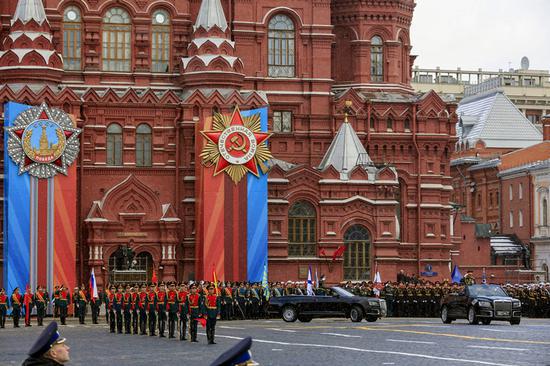
Victory Day military parade held in Moscow

Scenery of karst sinkhole in Guangxi

Insights | China and Europe: Growing cooperation and strong consensus against hegemony

China sends Smart Skynet-1 01 satellite into space

'Panda Train' on China-Laos railway makes debut in SW China

Wheat enters harvest in Yunnan

Xi arrives in Budapest for state visit to Hungary

Xi, Vucic jointly meet press in Belgrade

Xi attends welcome ceremony held by Serbian President Vucic

China's third aircraft carrier completes maiden sea trial

Xi arrives in Belgrade for state visit to Serbia
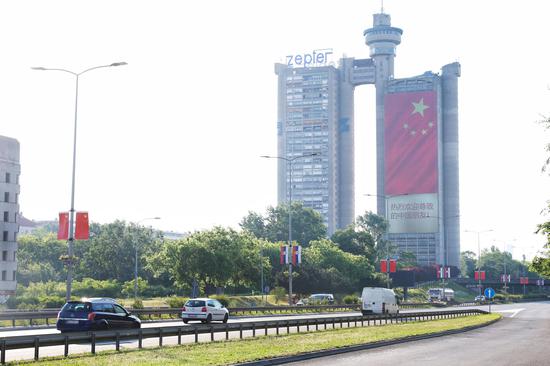
A glimpse of Serbia's capital Belgrade

French puppet show staged in C China amid 60th anniv. of diplomatic ties

Macron hosts Xi at mountain restaurant in picturesque southern France
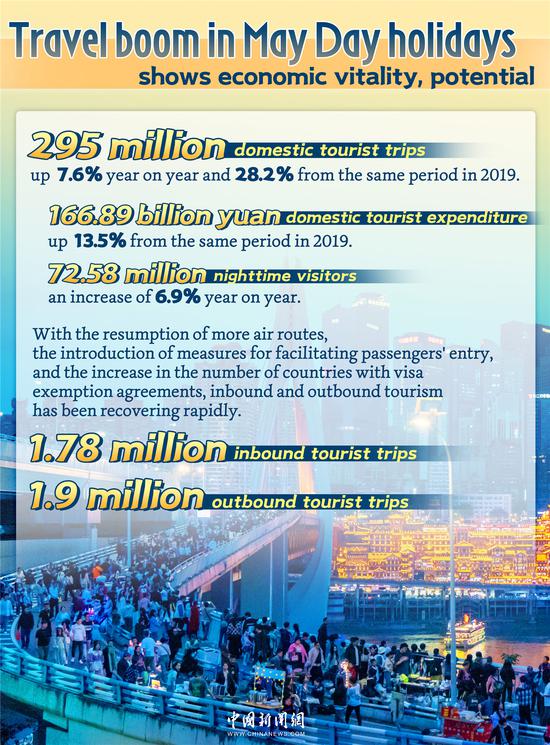
In Numbers: Travel boom in May Day holidays

Cradle of civilization: Gongshutang
Most popular in 24h, more top news.
- Beijing warns Manila not to abuse fishing arrangement
- U.S. politicizing trade issues is another mistake: Chinese FM
- Microsoft denies asking AI team to relocate from China
- Embassy on new tariffs: China to do 'whatever necessary' to defend its interests
- China urges U.S., UK and Australia to stop AUKUS nuclear submarine deal: FM spokesperson

The 'Song' of Yunnan Tea|Why Have They Come from Afar and Chosen Yunnan?

The "Ya" of Yunnan Tea|A Yunnan Bamboo Weaver's Bond with Tea


IMAGES
VIDEO
COMMENTS
FlixBus operates a bus from Budapest-Kelenföld to Split Bus Station twice daily. Tickets cost €55 - €85 and the journey takes 11h 10m. Alternatively, Hungarian Railways (MÁV) operates a train from Budapest-Kelenfoeld to Split 3 times a week. Tickets cost €35 - €45 and the journey takes 14h 48m.
Budapest to Split overnight train. Seasonal Train Budapest - Split Departure: 18:20 / Arrival: 08:24 Runs from 13 June till 29 August only. Departures: Tuesday, Friday and Sunday - From Budapest (Keleti station) - Night Train - Find more here! Budapest to Split Overnight Train . Budapest to Split train ticket and seat reservation price
FlixBus operates a bus from Split Bus Station to Budapest-Kelenföld twice daily. Tickets cost $60-90 and the journey takes 11h. Alternatively, Hungarian Railways (MÁV) operates a train from Split to Budapest-Kelenfoeld 3 times a week. Tickets cost $35-45 and the journey takes 15h 22m. Rome2Rio's Travel Guide series provide vital ...
FlixBus operates a bus from Budapest-Kelenföld to Split Bus Station twice daily. Tickets cost €55 - €85 and the journey takes 11h 10m. Alternatively, Hungarian Railways (MÁV) operates a train from Budapest-Kelenföld to Split 3 times a week. Tickets cost €30 - €40 and the journey takes 14h 48m. Airlines.
Trains from Budapest to Split cover the 302 miles (487 km) long journey with our travel partners like RegioJet a. S. Or EuroNight. Travelers depart most frequently from Budapest-Kelenfoeld and arrive in Split Predgrađe.
The best way to travel from Budapest to Split is by taking a train because it's the best combination of price and speed. 02:40PM 17h40. Budapest Keleti. 08:20AM Split, Autobusni Kolodvor $ 113 1 One-way. 1 transfer. Cheapest. 02:40PM 17h40. Budapest Keleti. 08:20AM Split, Autobusni Kolodvor $ 113 1 One-way.
The Budapest to Split train travel takes about 15 hours and 3 minutes, no matter when you leave. What are the Budapest to Split train times and schedule? If you're travelling on a weekday, you'll find the earliest train to Split leaving Budapest at around 11:40 and the last train leaving at around 21:40 .
Buses. $101. 12h 14m. Find flights to Split from $55. Fly from Budapest on Austrian Airlines, Air Serbia and more. Search for Split flights on KAYAK now to find the best deal.
1 stop. Wed, Jul 10 SPU - BUD with easyJet. 1 stop. from $137. Split.$193 per passenger.Departing Wed, Jun 26, returning Sat, Jun 29.Round-trip flight with Wizz Air and easyJet.Outbound indirect flight with Wizz Air, departing from Budapest on Wed, Jun 26, arriving in Split.Inbound indirect flight with easyJet, departing from Split on Sat ...
To travel by train from Budapest in Hungary to Split in Croatia, use a connection of the main route from Budapest to Zagreb. There are two main routes. Compare them and decide which one feeds your needs best. 1 Budapest (Hungary) - Split (Croatia) 2 Budapest (Hungary) - Zagreb (Croatia) - Split (Croatia) 488 km
Compare flight deals to Split from Budapest from over 1,000 providers. Then choose the cheapest or fastest plane tickets. Flex your dates to find the best Budapest-Split ticket prices. If you are flexible when it comes to your travel dates, use Skyscanner's 'Whole month' tool to find the cheapest month, and even day to fly to Split from Budapest.
KAYAK is a travel search engine. That means we look across the web to find the best prices we can find for our users. With over 2 billion flight queries processed yearly, we are able to display a variety of prices and options on flights from Budapest to Split.
Airlines: Austrian Airlines, Eurowings and Air Serbia flights from Budapest to Split. Buy your official Austrian Airlines, Eurowings and Air Serbia flight tickets from Budapest to Split from $86 (€74) with Omio. Find flight times and tickets for over 1000 travel companies to compare and book the most popular route.
Trains from Budapest to Split cover the 302 miles long route taking on average 17 h 40 min with our travel partners like RegioJet a. S. Or EuroNight. While the average ticket price for this route costs around £90, you can find the cheapest train ticket for as low as £62. Travellers depart most frequently from Budapest-Kelenfoeld and arrive in ...
FlixBus operates a bus from Budapest Airport to Split Bus Station 5 times a week. Tickets cost €55 - €85 and the journey takes 10h. Alternatively, Hungarian Railways (MÁV) operates a train from Budapest-Keleti to Split 3 times a week. Tickets cost €30 - €40 and the journey takes 15h 4m.
The average travel time between Budapest and Split is around 11h 35m, although the fastest bus will take about 9h 5m. This is the time it takes to travel the 303 miles that separates the two cities. How many daily bus connections are there between Budapest and Split?
The journey Budapest to Split takes as little as 10 hours 40 minutes and can cost as little as 39,99 €. The first bus leaves at 08:00 and the last bus leaves at 23:59 . FlixBus runs 5 rides each day between Budapest and Split and when travelling with FlixBus, you can expect free Wifi, power sockets and a guaranteed seat for your journey.
Compare flight deals to Split from Budapest from over 1,000 providers. Then choose the cheapest or fastest plane tickets. Flex your dates to find the best Budapest-Split ticket prices. If you are flexible when it comes to your travel dates, use Skyscanner's 'Whole month' tool to find the cheapest month, and even day to fly to Split from Budapest.
Budapest dates back to the Old Stone Age, and it's one of the cheapest places to travel in Europe. It's split by the Danube River and comprises three main areas - Pest, Buda, and Óbuda.
These are Amazon's best-selling travel products that you may need for coming to Paris. Bookstore. The best travel book : Rick Steves - Paris 2023 - Learn more here; Fodor's Paris 2024 - Learn more here Travel Gear. Venture Pal Lightweight Backpack - Learn more here Samsonite Winfield 2 28″ Luggage - Learn more here Swig Savvy's Stainless Steel Insulated Water Bottle - Learn ...
FlixBus. Buses from Budapest to Split cover the 302 miles (487 km) long route taking on average 10 h 35 min with our travel partners like FlixBus. Normally, there is 1 bus operating per day. You can get the cheapest bus tickets for this route for as low as $44 (€38), but the average price of bus tickets is $51 (€45).
The train between Budapest and Split takes 14h 48m. The train runs, on average, 3 times per week from Budapest to Split. The journey time may be longer on weekends and holidays; use the search form on this page to search for a specific travel date.
Forbes Lifestyle Travel. New Olympic Sporting Events Coming To Paris ... (rotating on a shoulder with legs split in the air). ... (May 16-19) and the second in Budapest (June 20-23). Skateboarding ...
An equal gender split of 464 athletes from 120 National Federations are competing in sport climbing (boulder & lead and speed), skateboarding (park and street), BMX freestyle and breaking. After this first-ever Olympic Qualifier Series (Shanghai-Budapest) 150 of the athletes competing will have qualified for Paris 2024.
The family began to split along linguistic lines. Two children born in the United States never learned Cantonese at all. It is a story, Wong Fillmore writes, "that many immigrant families have ...
FlixBus operates a bus from Split Bus Station to Budapest-Kelenföld twice daily. Tickets cost 23 000 Ft - 32 000 Ft and the journey takes 11h. Alternatively, Hungarian Railways (MÁV) operates a train from Split to Budapest-Kelenfoeld 3 times a week. Tickets cost 13 000 Ft - 16 000 Ft and the journey takes 15h 22m. Airlines.
Chen said that advocating "independence" goes against the national interest, and stringent legal measures will be implemented to combat activities that seek to split the country or incite separatism.
Split. The average bus between Budapest and Split takes 10h 17m and the fastest bus takes 9h 5m. The bus service runs several times per day from Budapest to Split. The journey time may be longer on weekends and holidays; use the search form on this page to search for a specific travel date.